
Bhagavad Gita’s philosophy is the practical, universal, eternal and absolute philosophy of Life. Maha Vishnu (the great God Bharata) himself incarnated on earth to deliver this highest purpose of life, which was to teach and spread the divine wisdom to all. Read a collection of Bhagavad Gita quotes compiled by Sadhvi Nishtha Om
What is the meaning of the Bhagavad Gita?
Gau (Cow), Ganga (Ganges/the river), Gita (the Holy book), and Gayatri (the Mantra) are the four pillars of the Sanātana Dharma. The Shrimad Bhagavad Gita expounds the knowledge of how to perceive life and live a meaningful life.
The discourse given by Lord Krishna to Arjuna during Mahabharata, as written by Maharshi Veda Vyasa, is called Bhagavad Gita. Bhagavad means’ someone who is like God,’ and Gita means the ‘Song of God.’ Something which is like Bhagwan is Bhagwat. Therefore it is not mere knowledge or scripture; it is a song.
Bhagavad Gita is the song of Lord Shri Krishna, which has been called ‘Gita’ for a reason. This life is also like a song. Some sing it with love, some sing it with rules, many do not know how to sing, others know it but do not sing, and some attempt to sing it.
The divine has given us the voice, the intellect, the mind, and the senses to everyone but the kind of song they want to compose and sing with the given blessings depend entirely on us.
The Bhagavad Gita contains not only the answers to all our questions but also all the questions that we can have: hence, this is not ordinary scripture.
Who wrote Bhagavad Gita?
व्यासप्रसादाच्छ्रुतवानेतद्गुह्यमहं परम् |
योगं योगेश्वरात्कृष्णात्साक्षात्कथयत: स्वयम् || BG 18.75||
vyāsa-prasādāch chhrutavān etad guhyam ahaṁ param
yogaṁ yogeśhvarāt kṛiṣhṇāt sākṣhāt kathayataḥ svayam
Sunjay says by Veda Vyas’s grace, I have heard this supreme and most secret knowledge.
The Bhagavad Gita is considered one of the oldest Upanishads and is over 5000 years old. Through Maharishi Veda Vyasa, we received this supreme and most secret knowledge, a conversation between Shri Krishna and Arjuna, the great warrior of Mahabharata.
He is also the compiler of several significant Hindu scriptures such as the Brahma Sūtras, the Puraṇas, the Mahabharata, etc. Maharishi Veda Vyasa was a great sage with the power of clairvoyance; thus, he heard not only the conversation between Shri Krishna and Arjun but also between Sanjay and Dhritarashtra. Thereby, he included both conversations while compiling the Bhagavad Gita.
Maharishi Ved Vyas says there is no need to wander. The Bhagavad Gita that has come out of Lord Krishna’s mouth is the only one worthy of singing. It is not an ordinary song; it is a beautiful song sung by Lord Krishna. In its essence, Shrimad Bhagavad Gita explains the human life cycle and the art of living and guides us to lead a wholesome life.
How many chapters and shlokas are there in Bhagavad Gita?
The Bhagavad Gita is the essence of all Vedic knowledge and one of the most important Upanishads in Vedic literature. It contains 18 chapters and 700 verses (ślokas or shlokas). Of these, 574 have been delivered by Lord Krishna, 84 by Arjuna, and 41 by Sanjay. One ślokas: the first one- is spoken by Dhritarashtra.
Why is it called Upanishad?
The Bhagavad Gita is called an Upanishad. It is neither a Purana, Veda, nor a Samhita. The Vedas have four main characteristics, and in Sanātana Dharma, every Veda has four subdivisions.
The first is the ‘Samhitas’ which has benedictions (Stuthi). For example, in Rigveda, all benediction or Stuthis found would be present in Rigveda Samhita. Different sages have compiled those Samhitas.
Then comes the ‘Brahmanas.’ They detail the karmic actions one should do if one believes in the Vedas. Sanātana Dharma has the main shastra (science) called Shatapatha Brahmana. Many karmakāṇḍas follow this shastra to know mantras to chant during a marriage, where to keep a water pot, how to do an Anushthana, etc.
There is another called ‘Araṇyaka,’ where ‘Aranya’ means jungle – forest. The ancient sages sat in dense forests, reflected upon specific thoughts, and collected relevant insights to impart to their disciples. Gradually Aranyaka was made by writing the sacred knowledge on a Pandulipi, an invention.
And the fourth one is the ‘Upanishads.’ In the Upanishads, a Guru always imparts direct knowledge to a disciple. The word Upanishad means “sitting down nearby”; from Upa “by” and ni-ṣad, “sit down” translates to sitting down near.
You are not in Upādhi (imposition or limitation) or samadhi (contemplation or concentration), but you are Upanishad (sitting down near).
You are close to attainment; you’re in Sanidhya. So, the Bhagavad Gita is called a Upaniṣad.
Life lessons from Bhagavad Gita
Only four people spoke in the Bhagavad Gita. They were Dhritarashtra, Sanjay, Arjun, and Shri Krishna. In Shrimad Bhagavad Gita, Dhritarashtra represents tamas, Sanjay-sattva, Arjun-rajas, and Krishna, who is beyond these attributes, represents selflessness and one without desires. Similarly, there are four stages in a person’s life to go from being a human to becoming one with God.
The first one to speak is Dhritarashtra, and the Bhagavad Gita starts with him, which means that human life is born out of darkness. When a baby is in its mother’s womb, it experiences that all is dark. While still in the womb, the mother has affection for the baby and the baby towards the mother. The baby enters the world and starts his journey toward the light. His attachment towards himself, his relatives, and his family start building.
Then comes Sanjaya, who has a divine vision (Divya-Drishti).
A person can see events at a distance if he has a guiding force. We need someone in life who can remind us if things are wrong. If we want to keep someone happy, keep agreeing with them, and if we were to tell someone they’re wrong and disagree with them, they’ll be unhappy.
निंदक नियरे राखिये, आँगन कुटी छवाय | बिन पानी बिन साबुन, निर्मल करे सुभाव ||
Nindak nihare rakhiye, aangan kuti chhaway
You should always have someone near you who can tell you that you’re at fault.
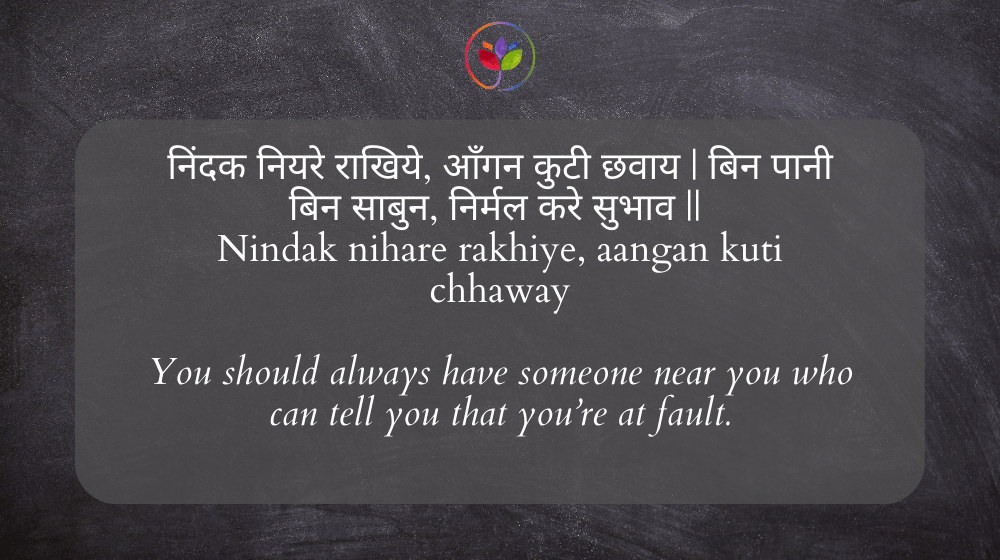
Dhritarashtra is blind in attachment. Sanjaya is a medium with the gift of seeing the past, present, and future (Divya-Drishti) right in front of him, granted by the sage Vyasa.
So, Tamas is Dhritarashtra, Rajas is Arjuna, Sattva is Sanjaya, and then on top is Gunatit, directly (sakshat) God, Shri Krishna himself. These are the four stages to go from soul to supreme soul. The fourth stage is Gunatit.
Wherever in the Bhagavad Gita, Arjuna, Dhritarashtra, or Sanjaya has said something; it says Dhritarashtra uvācha, Sanjaya uvācha, Arujuna uvācha, but wherever Shri Krishna says anything, it says śhrī-bhagavān uvācha.
The God who has Śhrī seated with him. Śhrī means refuge, and Śhrī means fortune. The God with whose devotion and worship a person gets the ability to provide refuge to others.
Bala (Power),Buddhi (discretion, Brainpower), Vīryam (prowess), Tejas (brilliance), Aiśvaryam (prosperity), Śakti, Vijñānam (super-knowledge). These are the Ṣaḍguṇa (षड्गुण): the six qualities or attributes of Bhagavān (God).
How to read Bhagavad Gita?
इदं ते नातपस्काय नाभक्ताय कदाचन |
न चाशुश्रूषवे वाच्यं न च मां योऽभ्यसूयति ||B.G:18.67||
idaṁ te nātapaskyāya nābhaktāya kadāchana
na chāśhuśhruṣhave vāchyaṁ na cha māṁ yo ‘bhyasūtayi
Bhagwan said, do not impart this knowledge to someone who has no devotion in their heart for me. If someone does not have faith in his heart for me, Kaunteya; a person who has not done penance in his life, the one who has no devotion, the one who cannot listen with faith, do not give it to that person but give it to anyone else.
“Krishna tells Arjun not to share the knowledge of the Bhagavad Gita with people who don’t have devotion and reverence towards him, he says. Any person who reads the Bhagavad Gita just like a book will not be able to get the essence and secret of it. Till a person does not understand its innermost meaning and secret, it will be just a piece of dry knowledge without illuminating their lives in any way,” says Om Swamiji.
When a person retains Bhagavad Gita through his mind, using his brain, and tries to read it as a book, he will never be able to imbibe it in his life. The Bhagavad Gita’s real secret never gets translated into his heart until the real secret does not flow within; up till then, it is just dry knowledge.
Bhagavad Gita may become someone’s crutch in life; with the help, they can run their lives, but it won’t become a lamp that lights up their life path.
When we only use our minds to understand something and do not absorb it internally, we become dependent on it.
Benefits of reading the Bhagavad Gita
Understanding Emotions and Transcending Self Doubt
अर्जुन उवाच |
दृष्ट्वेमं स्वजनं कृष्ण युयुत्सुं समुपस्थितम् || BG 1.28||
सीदन्ति मम गात्राणि मुखं च परिशुष्यति |
arjuna uvācha
dṛiṣhṭvemaṁ sva-janaṁ kṛiṣhṇa yuyutsuṁ samupasthitam
sīdanti mama gātrāṇi mukhaṁ cha pariśhuṣhyati
Arjun said: O Krishna, seeing my own kinsmen arrayed for battle here and intent on killing each other, my limbs are giving way, and my mouth is drying up.
Arjuna faced the emotion of fear, confusion, and self-doubt before starting the Mahabharata war and did not want to fight. Similarly, each of us often feels overwhelmed by our own emotions, has self-doubt, and worries about the future; as a result, we tend to neglect our responsibilities.
Lord Krishna helped Arjun to shed all his crippling thoughts by making him understand the concept of Karma and Dharma ( check out the powerful karma quotes ). He understood his role in the scheme of events and eventually was convinced to fight.
Likewise, everyone fears relationships, employment, education, finance, etc. Reading Bhagavad Gita helps in calming the mind and reduces unwarranted anxieties. Shri Krishna emphasizes discovering our truth and understanding our potential, which allows us to attend to our responsibilities.
Understanding the meaning of right karma
The Meaning of The Right Karma
कर्मणो ह्यपि बोद्धव्यं बोद्धव्यं च विकर्मण: |
अकर्मणश्च बोद्धव्यं गहना कर्मणो गति: || BG 4.17||
karmaṇo hyapi boddhavyaṁ boddhavyaṁ cha vikarmaṇaḥ
akarmaṇaśh cha boddhavyaṁ gahanā karmaṇo gatiḥ
You must understand the nature of all three—recommended action, wrong action, and inaction. The truth about these is profound and challenging to comprehend.
Often, we experience circumstances where we find it challenging to differentiate between what is right and wrong. In the lack of faith and wisdom, we act incorrectly, consciously or unconsciously. Bhagavad Gita encourages us to contemplate our actions and work without attachment.
It also elucidates the difference between Karma, Vikarma, and Akarma. It reveals that a soul gets a particular type of physical body per the desires and fruits of past Karma. Also, Shri Krishna offers a solution in the form of devotional service, which can free us from this cycle of Birth and Death.
Learn the meaning of Selfless Action
Role of Selfless Actions
यस्त्विन्द्रियाणि मनसा नियम्यारभतेऽर्जुन |
कर्मेन्द्रियै: कर्मयोगमसक्त: स विशिष्यते || BG 3.7||
yas tvindriyāṇi manasā niyamyārabhate ’rjuna
karmendriyaiḥ karma-yogam asaktaḥ sa viśhiṣhyate
But those karma yogis who control their knowledge senses with the mind, O Arjun, and engage the working senses in working without attachment are superior.
When worry engulfs us and dark clouds of our problems haunt us, we tend to hide and avoid actions. Shri Krishna explains to Arjuna how to perform righteous and selfless acts. One of the most profound teachings of the Bhagavad Gita is to – Perform actions or duties without worrying about the results, which is the secret of getting rid of worries.
Selflessness helps us realize that the world is one family (Vasudhaiva Kutumbakam). It motivates us to do such actions to help improve the world.
Learn how to lead a balanced life
Leading a Balanced Life
युक्ताहारविहारस्य युक्तचेष्टस्य कर्मसु |
युक्तस्वप्नावबोधस्य योगो भवति दु:खहा || BG 6.17||
yuktāhāra-vihārasya yukta-cheṣhṭasya karmasu
yukta-svapnāvabodhasya yogo bhavati duḥkha-hā
But those who are temperate in eating and recreation, balanced in work, and regulated in sleep, can mitigate all sorrows by practicing Yog.
We get exhausted with excessive activity, whereas inactivity takes us toward stagnation. Sometimes we fail to strike the right balance between work and rest, action and inaction.
The Bhagavad Gita provides guidelines on how to strike that balance; the balance between our work, family, desires, hobbies, emotional needs, and intellectual pursuits. This balance directs our life more toward yoga.
Its wisdom empowers us to make better decisions, and making the right decisions requires decluttering life and clearing our heads. Eventually, both our personal and professional lives will have positive impact.
Learn to Know the Yoga for your liberation
Choice of Yoga for Liberation
तं विद्याद् दु:खसंयोगवियोगं योगसञ्ज्ञितम् |
स निश्चयेन योक्तव्यो योगोऽनिर्विण्णचेतसा || BG 6.23||
taṁ vidyād duḥkha-sanyoga-viyogaṁ yogasaṅjñitam
sa niśhchayena yoktavyo yogo ’nirviṇṇa-chetasā
That state of severance from union with misery is known as Yog. This Yog is a resolution practice with determination and free from pessimism.
In life, we ACT, THINK, FEEL, or SURRENDER. To act is Karma Yoga, to think is Jnana Yoga, to feel (love) is Bhakti Yoga, and to Surrender completely is Samadhi.
The four yogas are four paths mentioned in the Bhagavad Gita for the liberation of the human soul.
Karma Yoga or the Path of Action (Karma-mārga)
Bhakti Yoga or the Path of Devotion (Bhakti-mārga) to Ishvar (God)
Jnana Yoga or the Path of Knowledge (Jñāna-mārga)
Raja Yoga or the Path of Meditation (dhyāna-mārga)
In essence, these four paths of yoga are the different approaches an individual can adopt to reach their ultimate goal of liberation.
Overcome Ignorance in life
Overcome Ignorance
तेषामेवानुकम्पार्थमहमज्ञानजं तम: |
नाशयाम्यात्मभावस्थो ज्ञानदीपेन भास्वता || BG 10.11||
teṣhām evānukampārtham aham ajñāna-jaṁ tamaḥ
nāśhayāmyātma-bhāva-stho jñāna-dīpena bhāsvatā
Out of compassion for them, I, who dwell within their hearts, destroy the darkness born of ignorance with the luminous lamp of knowledge.
Everyone strives for lasting peace, albeit in the things of possessions and the outer world. Very few realize that the bliss (ananda) lies within our inner self. Bhagavad Gita suggests that the bliss can be gained through wisdom, meditation, and Divine grace.
The one who searches and strives to attain that state with a sincere heart indeed uncovers the manifold of ignorance. To realize God’s presence and be grateful for His grace, we must shed the clouds of ignorance from our consciousness.
Gain the understanding of Impermanence
Law of Impermanence
मात्रास्पर्शास्तु कौन्तेय शीतोष्णसुखदु: खदा: |
आगमापायिनोऽनित्यास्तांस्तितिक्षस्व भारत || BG 2.14||
mātrā-sparśhās tu kaunteya śhītoṣhṇa-sukha-duḥkha-dāḥ
āgamāpāyino ’nityās tans-titikṣhasva bhārata
O son of Kunti, the contact between the senses and the sense objects gives rise to fleeting perceptions of happiness and distress. These are non-permanent and come and go like the winter and summer seasons. O descendent of Bharat, one must learn to tolerate them without being disturbed.
We like clinging to the feelings of comfort and control; because that defines stability or predictability in our life. We yearn for relationships without realizing that all of them are temporary. Its transient nature eventually becomes the source of agony. Any unwanted change brings uncertainty, fear, and anxiety, as we are usually unaware of what is permanent and impermanent.
Bhagavad Gita gives us the skill to come out of the ignorance that we create with the desire for predictability and permanence.
Learn the importance of Meditation and Yoga
Importance of Meditation and Yoga
बन्धुरात्मात्मनस्तस्य येनात्मैवात्मना जित: |
अनात्मनस्तु शत्रुत्वे वर्ते तात्मैव शत्रुवत् || BG 6.6||
bandhur ātmātmanas tasya yenātmaivātmanā jitaḥ
anātmanas tu śhatrutve vartetātmaiva śhatru-vat
For those who have conquered the mind, it is their friend. For those who have failed to do so, the mind works like an enemy.
Shri Krishna explained the role of meditation and yoga in experiencing inner peace and joy. While we are not standing on a battlefield and fighting with enemies, there is a constant battle within our minds. Understanding and channelizing our thoughts is possible only through yoga and meditation.
Understand the reverence for your Guru
Reverence for a Guru
तद्विद्धि प्रणिपातेन परिप्रश्नेन सेवया |
उपदेक्ष्यन्ति ते ज्ञानं ज्ञानिनस्तत्त्वदर्शिन: ||BG 4.34||
tad viddhi praṇipātena paripraśhnena sevayā
upadekṣhyanti te jñānaṁ jñāninas tattva-darśhinaḥ
Learn the truth by approaching a spiritual master. Inquire from him with reverence and render service unto him. Such an enlightened Saint can impart knowledge unto you because he has seen the truth.
A seeker may feel lost on the spiritual path without a guru or master. Just like Arjun surrendered at Shri Krishna’s feet and took him as his master, every seeker needs a guide who can help in untying the knots of illusions and progress on the path with wisdom. Bhagavad Gita acts like a Guru and guides the mind, body, and soul.
Evoke devotion within
अथ चित्तं समाधातुं न शक्नोषि मयि स्थिरम् |
अभ्यासयोगेन ततो मामिच्छाप्तुं धनञ्जय || BG 12.9||
atha chittaṁ samādhātuṁ na śhaknoṣhi mayi sthiram
abhyāsa-yogena tato mām ichchhāptuṁ dhanañjaya
If you cannot fix your mind steadily on Me, O Arjun, practice remembering Me with devotion while constantly restraining the mind from worldly affairs.
Shri Krishna reveals the efficacy of devotion in the Bhagavad Gita. HE states that bhakti or devotion is the easiest way to reach the divine. Thus, with such a pearl of wisdom, we can inculcate faith and get in touch with our inner strength. It helps us anchor the boat of our unstable life and motivates us to tackle challenging situations in life.
Understand and gain the Knowledge of Soul
वासांसि जीर्णानि यथा विहाय
नवानि गृह्णाति नरोऽपराणि |
तथा शरीराणि विहाय जीर्णा
न्यन्यानि संयाति नवानि देही || BG 2.22||
vāsānsi jīrṇāni yathā vihāya
navāni gṛihṇāti naro ’parāṇi
tathā śharīrāṇi vihāya jīrṇānya
nyāni sanyāti navāni dehī
As a person sheds worn-out garments and wears new ones, likewise, at the time of death, the soul casts off its worn-out body and enters a new one.
Shri Krishna pronounces various attributes of the soul describing it as unborn, ancient, indestructible, eternal, immortal, etc. In the 2nd chapter, 22nd verse, HE compares the events of changing the material body (also called death) with putting on new garments while giving up the old and useless ones.
This knowledge about the soul can be profoundly empowering, especially in the phase of disease, death, grief, and uncertainty. It ensures that we have something at our core that cannot destroy, even in the most painful moments and troublesome situations.
Establish peace through surrender
Establishes Peace through Surrender
श्रीभगवानुवाच |
मय्यासक्तमना: पार्थ योगं युञ्जन्मदाश्रय: |
असंशयं समग्रं मां यथा ज्ञास्यसि तच्छृणु || BG 7.1||
śhrī bhagavān uvācha
mayyāsakta-manāḥ pārtha yogaṁ yuñjan mad-āśhrayaḥ
asanśhayaṁ samagraṁ māṁ yathā jñāsyasi tach chhṛiṇu
The Supreme Lord said: Now listen, O Arjun, how, with the mind attached exclusively to Me, and surrendering to Me through bhakti yoga, you can know Me completely, free from doubt.
This sacred scripture enlightens us that when a soul sincerely starts following the process of devotional service, his life takes an exceptional turn, rewarding in multiple ways, including peace of mind, purity of thoughts, desires, and above all, the sentiment or bhava of ‘Surrender.’
Shlokas Reference: https://www.holy-bhagavad-gita.org/
Bhagavad Gita quotes on Karma Yoga
God helps those who help themselves.
यस्त्विन्द्रियाणि मनसा नियम्यारभतेऽर्जुन |
कर्मेन्द्रियै: कर्मयोगमसक्त: स विशिष्यते || BG 3.7||
yas tvindriyāṇi manasā niyamyārabhate ’rjuna
karmendriyaiḥ karma-yogam asaktaḥ sa viśhiṣhyate
But those karma yogis who control their knowledge senses with the mind, O Arjun, and engage the working senses in working without attachment are superior.
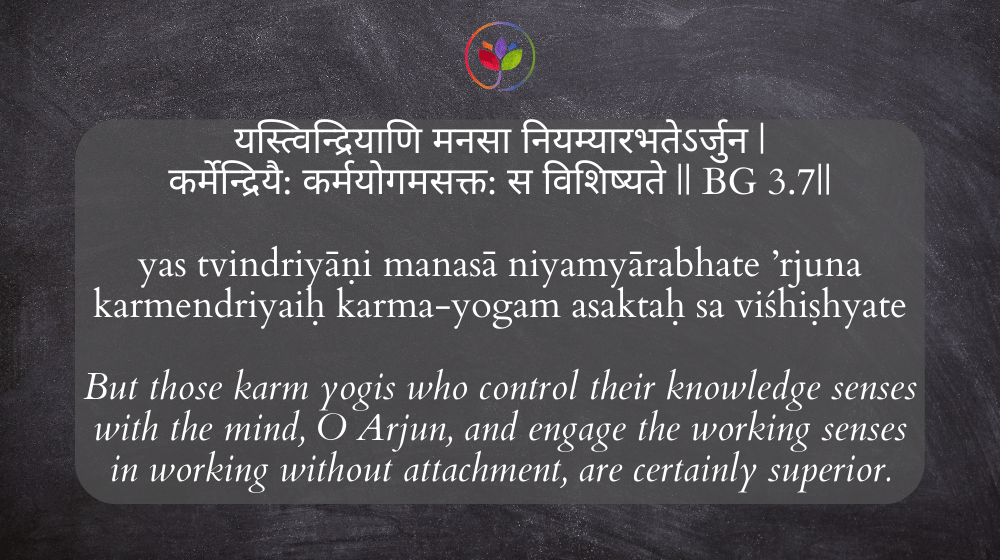
यज्ञार्थात्कर्मणोऽन्यत्र लोकोऽयं कर्मबन्धन: |
तदर्थं कर्म कौन्तेय मुक्तसङ्ग: समाचर || BG 3.9||
yajñārthāt karmaṇo ’nyatra loko ’yaṁ karma-bandhanaḥ
tad-arthaṁ karma kaunteya mukta-saṅgaḥ samāchara
Work must be done as a yajna to the Supreme Lord; otherwise, work causes bondage in this material world. Therefore, O son of Kunti, for the satisfaction of God, perform your prescribed duties without being attached to the results.
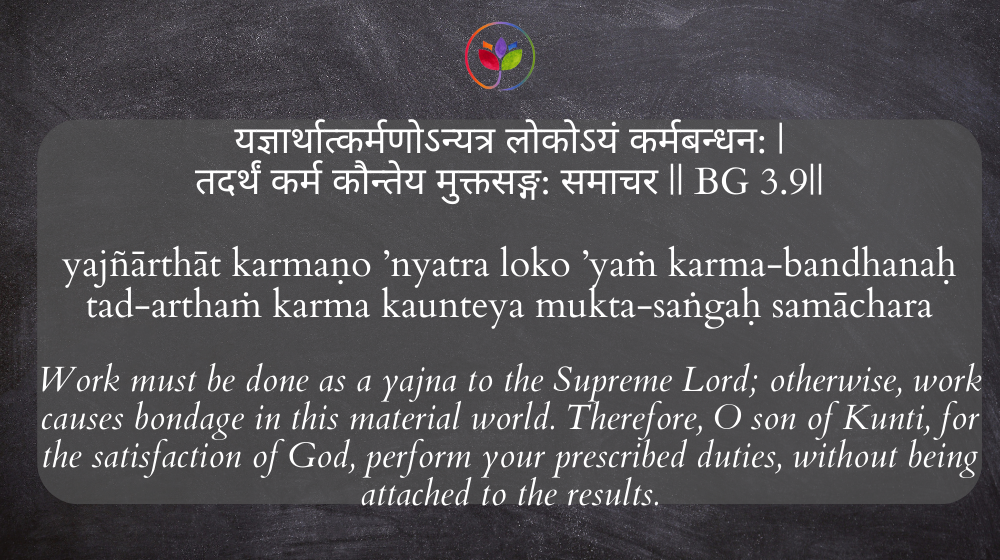
प्रकृते: क्रियमाणानि गुणै: कर्माणि सर्वश: |
अहङ्कारविमूढात्मा कर्ताहमिति मन्यते || BG 3.27||
prakṛiteḥ kriyamāṇāni guṇaiḥ karmāṇi sarvaśhaḥ
ahankāra-vimūḍhātmā kartāham iti manyate
The three modes of material nature carry out all activities. But in ignorance, the soul, deluded by false identification with the body, thinks of itself as the doer.
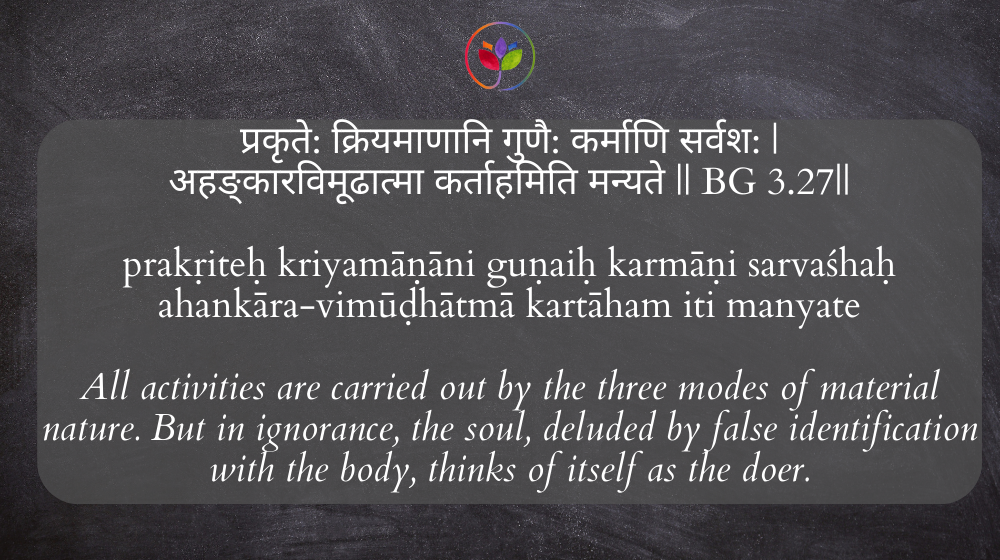
Bhagavad Gita quotes on ‘Gyan yoga’
The path of knowledge.
ये चैव सात्त्विका भावा राजसास्तामसाश्च ये |
मत्त एवेति तान्विद्धि न त्वहं तेषु ते मयि || BG 17.12||
ye chaiva sāttvikā bhāvā rājasās tāmasāśh cha ye
matta eveti tān viddhi na tvahaṁ teṣhu te mayi
The three states of material existence—goodness, passion, and ignorance—are manifested by My energy. They are in Me, but I am beyond them.
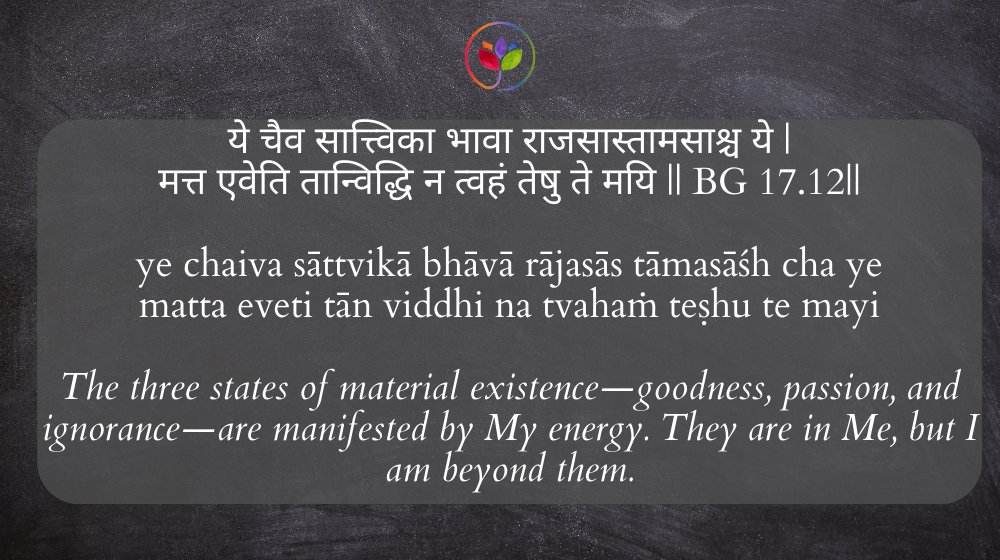
चतुर्विधा भजन्ते मां जना: सुकृतिनोऽर्जुन |
आर्तो जिज्ञासुरर्थार्थी ज्ञानी च भरतर्षभ || BG 7.16||
chatur-vidhā bhajante māṁ janāḥ sukṛitino ’rjuna
ārto jijñāsur arthārthī jñānī cha bharatarṣhabha
O best amongst the Bharatas, four kinds of pious people engage in My devotion—the distressed, the seekers of knowledge, the seekers of worldly possessions, and those who are situated in knowledge.
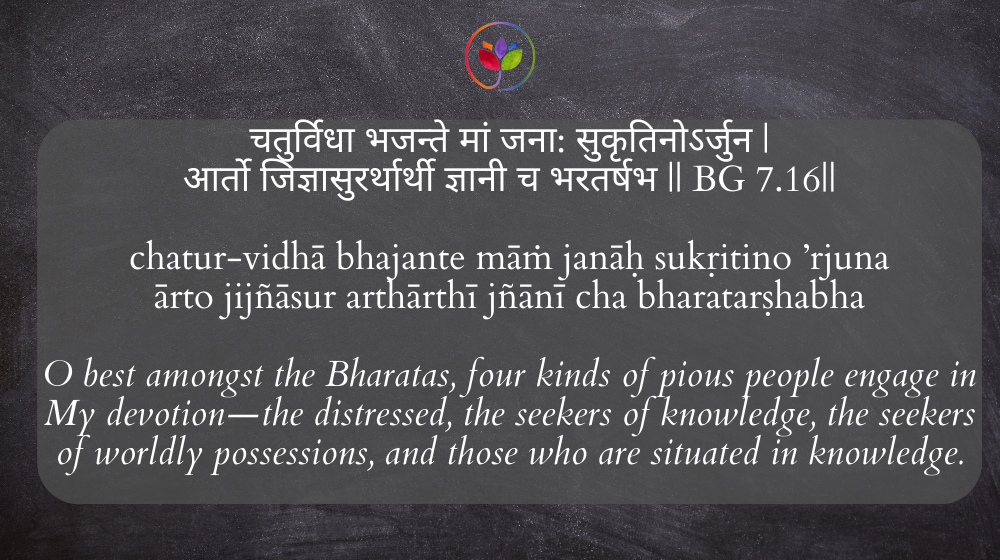
साधिभूताधिदैवं मां साधियज्ञं च ये विदु: |
प्रयाणकालेऽपि च मां ते विदुर्युक्तचेतस: || BG 7.30||
sādhibhūtādhidaivaṁ māṁ sādhiyajñaṁ cha ye viduḥ
prayāṇa-kāle ’pi cha māṁ te vidur yukta-chetasaḥ
Those who know Me as the governing principle of the adhibhūta (field of matter) and the Adhidaiva (the celestial gods) and as adhiyajña (the Lord of all sacrificial performances), such enlightened souls are in full consciousness of Me even at the time of death.
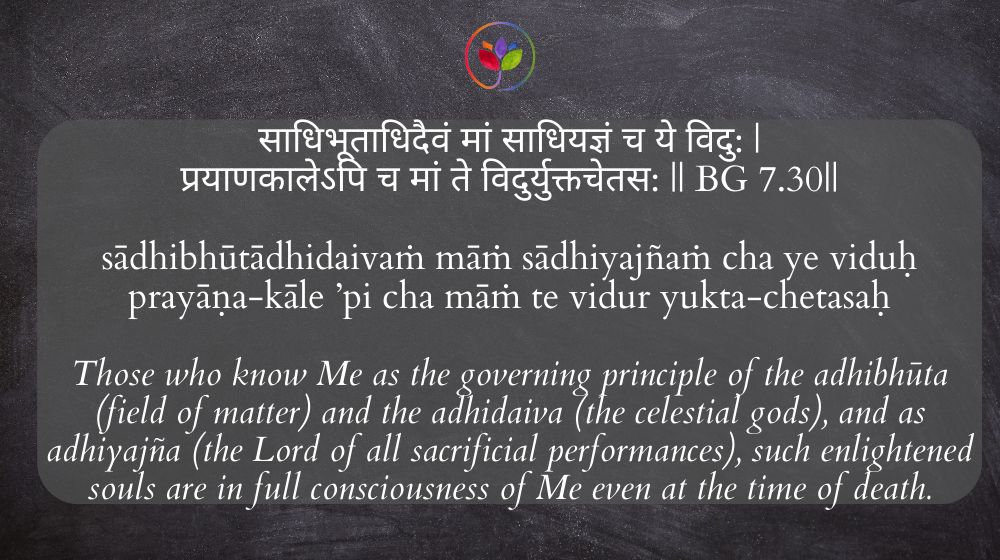
Bhagavad Gita quotes on ‘Bhakti Yoga’
The path of devotion
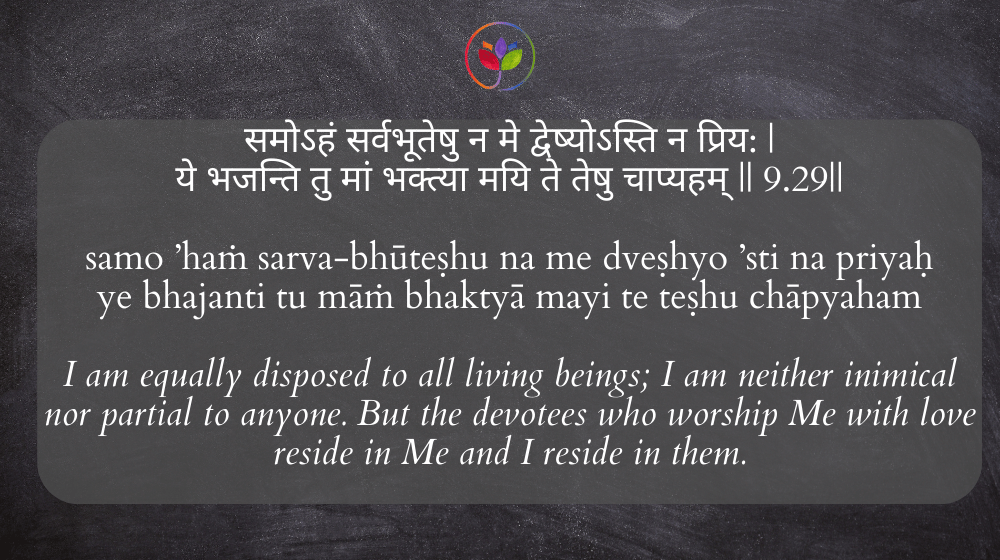
ये तु सर्वाणि कर्माणि मयि संन्न्यस्य मत्पर: |
अनन्येनैव योगेन मां ध्यायन्त उपासते ||
तेषामहं समुद्धर्ता मृत्युसंसारसागरात् |
भवामि नचिरात्पार्थ मय्यावेशितचेतसाम् || Bg 12.6-7||
ye tu sarvāṇi karmāṇi mayi sannyasya mat-paraḥ
ananyenaiva yogena māṁ dhyāyanta upāsate
teṣhām ahaṁ samuddhartā mṛityu-saṁsāra-sāgarāt
bhavāmi na chirāt pārtha mayy āveśhita-chetasām
But those who dedicate all their actions to Me, regarding Me as the Supreme goal, worshiping Me and meditating on Me with exclusive devotion, O Parth, I swiftly deliver them from the ocean of birth and death, for their consciousness is united with Me.
अभ्यासेऽप्यसमर्थोऽसि मत्कर्मपरमो भव |
मदर्थमपि कर्माणि कुर्वन्सिद्धिमवाप्स्यसि || BG 12.10||
abhyāse’ py asamartho’ si mat-karma-paramo bhava
mad-artham api karmāṇi kurvan siddhim avāpsyasi
If you cannot practice remembering Me with devotion, try to work for Me. Thus performing devotional service to Me, you shall achieve the stage of perfection.
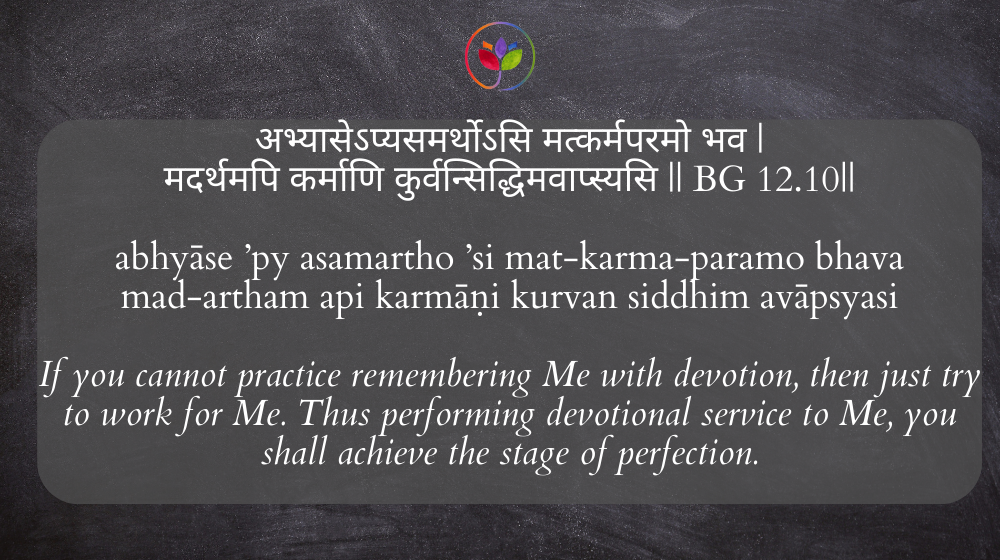
अनपेक्ष: शुचिर्दक्ष उदासीनो गतव्यथ: |
सर्वारम्भपरित्यागी यो मद्भक्त: स मे प्रिय: || BG 12.16||
anapekṣhaḥ śhuchir dakṣha udāsīno gata-vyathaḥ
sarvārambha-parityāgī yo mad-bhaktaḥ sa me priyaḥ
Those who are indifferent to worldly gains, externally and internally pure, skillful, without cares, untroubled, and free from selfishness in all undertakings, such devotees of Mine are very dear to Me.
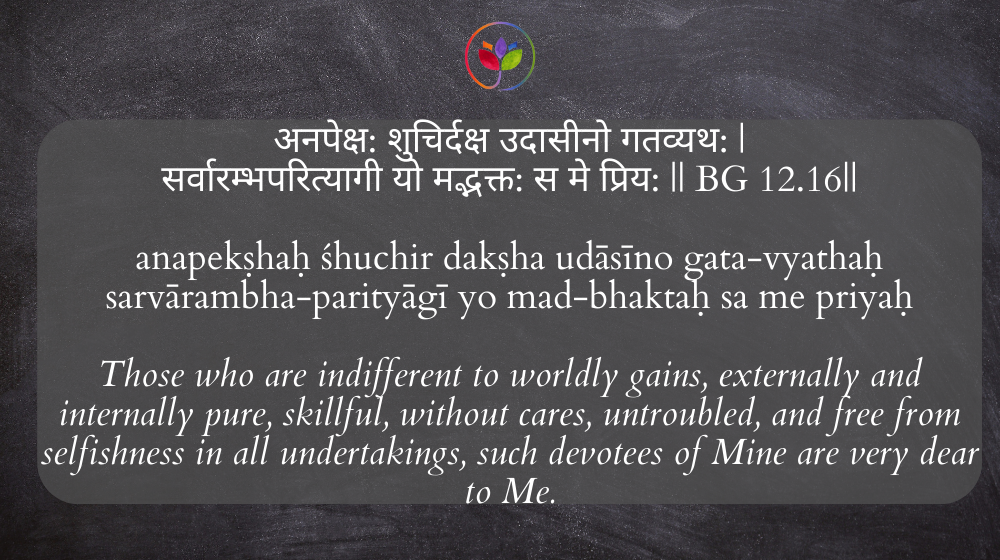
Bhagavad Gita quotes on ‘Moksha’
Your ultimate goal should be liberation.
स्पर्शान्कृत्वा बहिर्बाह्यांश्चक्षुश्चैवान्तरे भ्रुवो: |
प्राणापानौ समौ कृत्वा नासाभ्यन्तरचारिणौ ||
यतेन्द्रियमनोबुद्धिर्मुनिर्मोक्षपरायण: |
विगतेच्छाभयक्रोधो य: सदा मुक्त एव स: || BG 5.27,28||
sparśhān kṛitvā bahir bāhyānśh chakṣhuśh chaivāntare bhruvoḥ
prāṇāpānau samau kṛitvā nāsābhyantara-chāriṇau
yatendriya-mano-buddhir munir mokṣha-parāyaṇaḥ
vigatechchhā-bhaya-krodho yaḥ sadā mukta eva saḥ
Shutting out all thoughts of external enjoyment, with the gaze fixed on the space between the eye-brows, equalizing the flow of the incoming and outgoing breath in the nostrils, and thus controlling the senses, mind, and intellect, the sage who becomes free from desire and fear, always lives in freedom.
कार्यमित्येव यत्कर्म नियतं क्रियतेऽर्जुन |
सङ्गं त्यक्त्वा फलं चैव स त्याग: सात्त्विको मत: || BG 18.9||
kāryam ity eva yat karma niyataṁ kriyate ‘rjuna
saṅgaṁ tyaktvā phalaṁ chaiva sa tyāgaḥ sāttviko mataḥ
When actions are undertaken in response to duty, and one relinquishes attachment to any reward, O Arjun, it is considered renunciation in the nature of goodness.
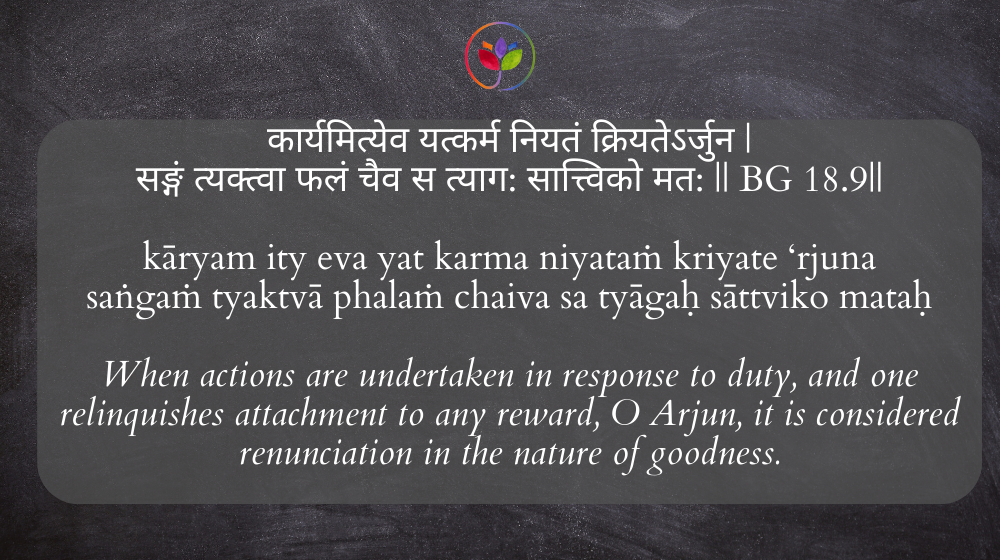
मन्मना भव मद्भक्तो मद्याजी मां नमस्कुरु |
मामेवैष्यसि सत्यं ते प्रतिजाने प्रियोऽसि मे || Bg 18.65||
man-manā bhava mad-bhakto mad-yājī māṁ namaskuru
mām evaiṣhyasi satyaṁ te pratijāne priyo ‘si me
Always think of Me, be devoted to Me, worship Me, and offer obeisance to Me. Doing so, you will certainly come to Me. This is My pledge to you, for you are very dear to Me.
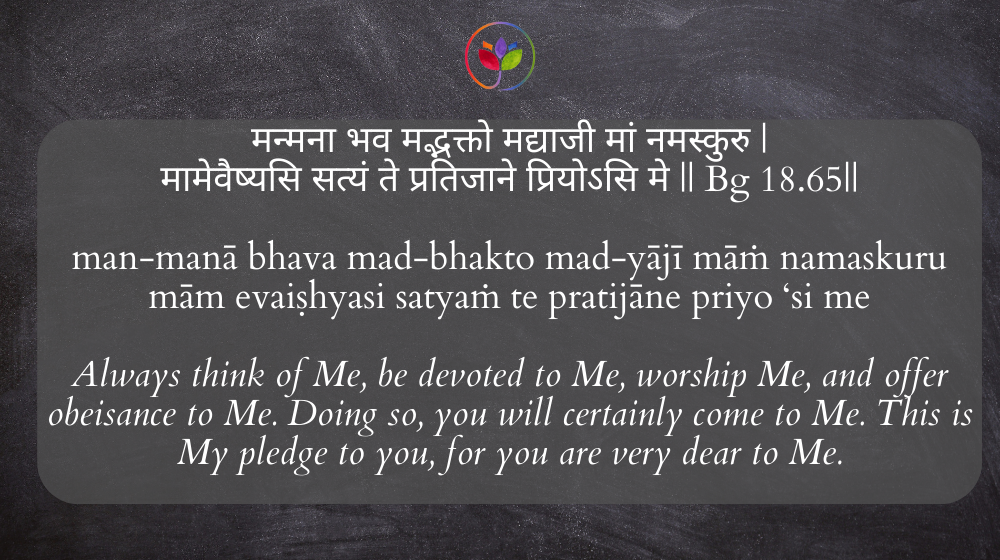
Bhagavad Gita quotes on Death
न जायते म्रियते वा कदाचि
नायं भूत्वा भविता वा न भूय: |
अजो नित्य: शाश्वतोऽयं पुराणो न हन्यते हन्यमाने शरीरे || BG 2.20||
na jāyate mriyate vā kadāchin nāyaṁ bhūtvā bhavitā vā na bhūyaḥ
ajo nityaḥ śhāśhvato ’yaṁ purāṇo na hanyate hanyamāne śharīre
The soul is neither born, nor does it ever die; nor having once existed, does it ever cease to be. The soul is without birth, eternal, immortal, and ageless. It is not destroyed when the body is destroyed.
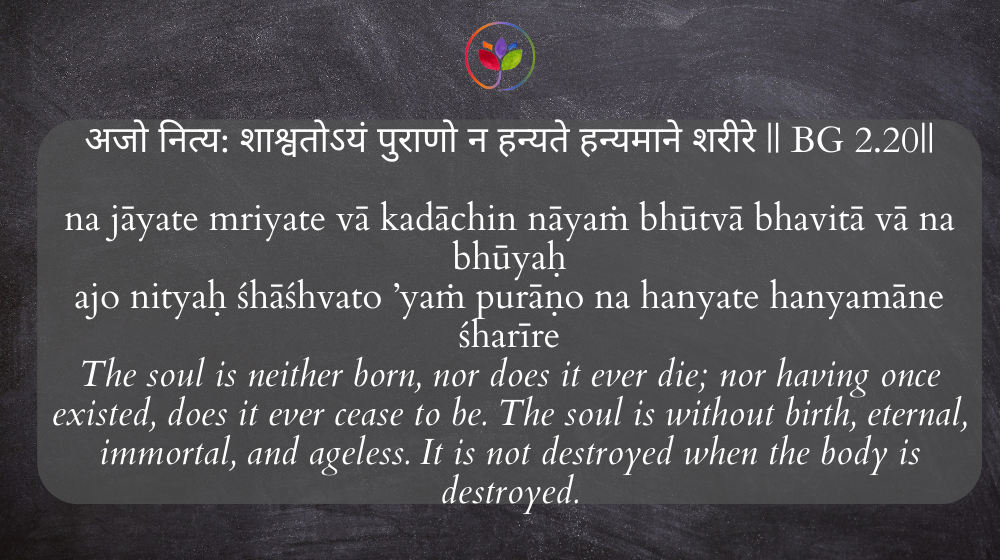
जातस्य हि ध्रुवो मृत्युर्ध्रुवं जन्म मृतस्य च |
तस्मादपरिहार्येऽर्थे न त्वं शोचितुमर्हसि || BG 2.27||
jātasya hi dhruvo mṛityur dhruvaṁ janma mṛitasya cha
tasmād aparihārye ’rthe na tvaṁ śhochitum arhasi
Death is certain for one who has been born, and rebirth is inevitable for one who has died. Therefore, you should not lament over the inevitable.
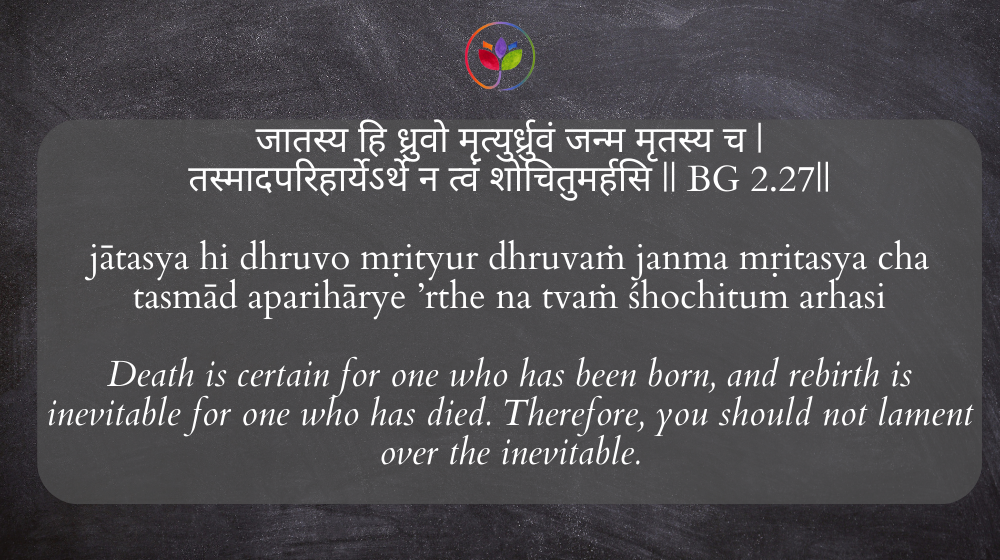
अन्तकाले च मामेव स्मरन्मुक्त्वा कलेवरम् |
य: प्रयाति स मद्भावं याति नास्त्यत्र संशय: || BG 8.5||
anta-kāle cha mām eva smaran muktvā kalevaram
yaḥ prayāti sa mad-bhāvaṁ yāti nāstyatra sanśhayaḥ
Those who relinquish the body while remembering Me at the moment of death will come to Me. There is certainly no doubt about this.
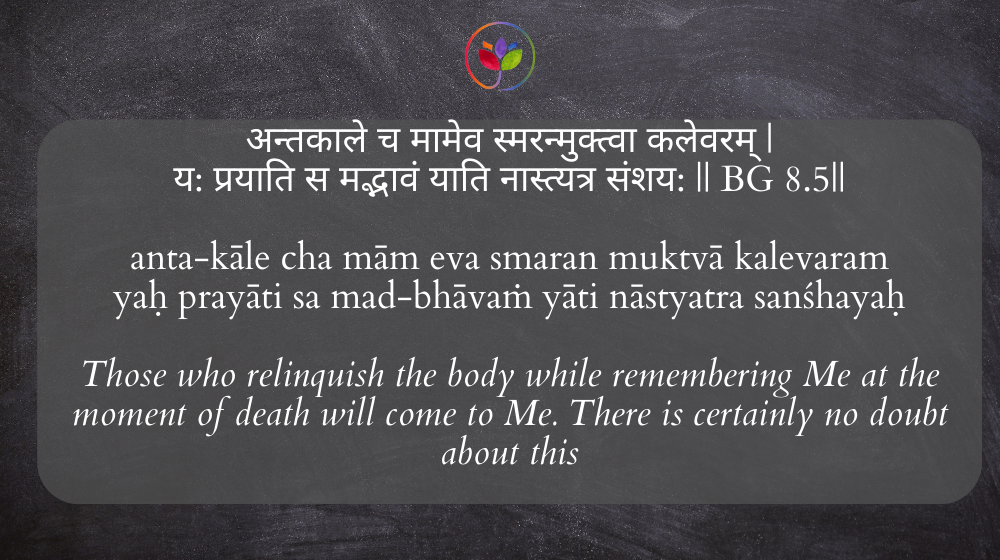
Bhagavad Gita quotes on Dharma
which means righteousness and duty, both of which are equally important.
स्वधर्ममपि चावेक्ष्य न विकम्पितुमर्हसि |
धर्म्याद्धि युद्धाच्छ्रेयोऽन्यत्क्षत्रियस्य न विद्यते || Bg 2.31||
swa-dharmam api chāvekṣhya na vikampitum arhasi
dharmyāddhi yuddhāch chhreyo ’nyat kṣhatriyasya na vidyate
Besides, considering your duty as a warrior, you should not waver. Indeed, for a warrior, there is no better engagement than fighting for upholding of righteousness.
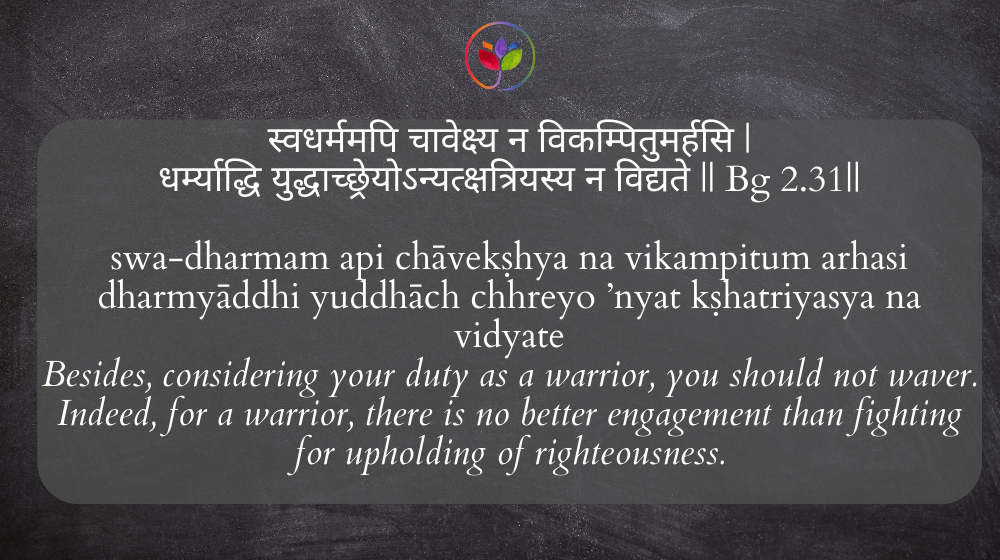
सुखदु:खे समे कृत्वा लाभालाभौ जयाजयौ |
ततो युद्धाय युज्यस्व नैवं पापमवाप्स्यसि || Bg 2.38||
sukha-duḥkhe same kṛitvā lābhālābhau jayājayau
tato yuddhāya yujyasva naivaṁ pāpam avāpsyasi
Fight for the sake of duty, treating alike happiness and distress, loss and gain, victory and defeat. Fulfilling your responsibility in this way, you will never incur sin.
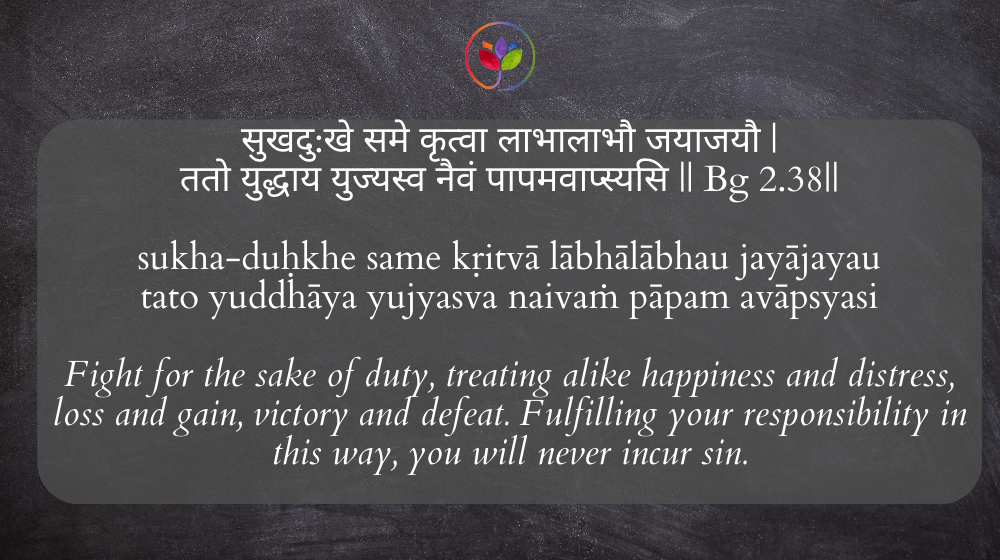
श्रेयान्स्वधर्मो विगुण: परधर्मात्स्वनुष्ठितात् |
स्वभावनियतं कर्म कुर्वन्नाप्नोति किल्बिषम् || BG 18.47||
śhreyān swa-dharmo viguṇaḥ para-dharmāt sv-anuṣhṭhitāt
svabhāva-niyataṁ karma kurvan nāpnoti kilbiṣham
It is better to do one’s dharma imperfectly than to do another’s dharma perfectly. By doing one’s innate duties, a person does not incur sin.
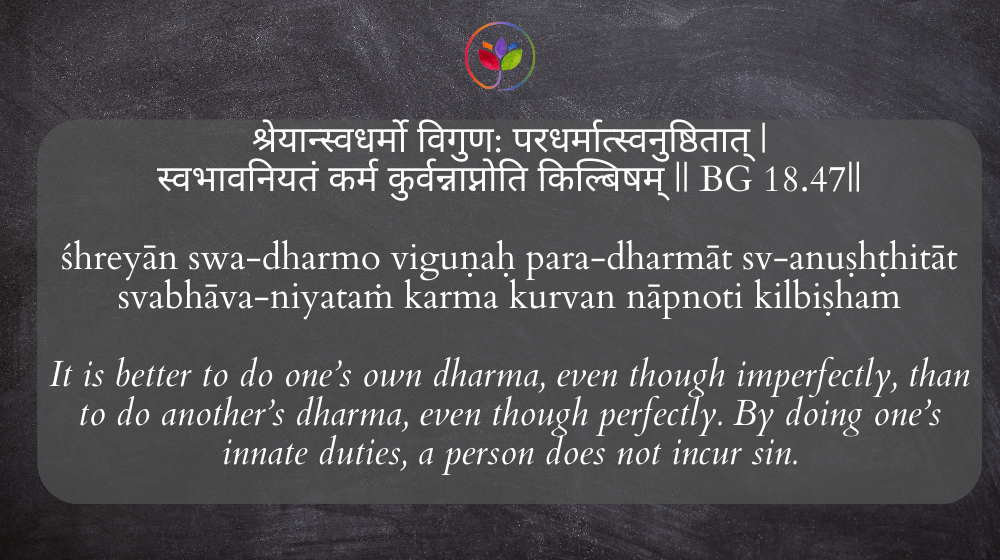
Bhagavad Gita quotes for Students.
व्यवसायात्मिका बुद्धिरेकेह कुरुनन्दन |
बहुशाखा ह्यनन्ताश्च बुद्धयोऽव्यवसायिनाम् || Bg 2.41||
vyavasāyātmikā buddhir ekeha kuru-nandana
bahu-śhākhā hyanantāśh cha buddhayo ’vyavasāyinām
O descendent of the Kurus, the intellect of those on this path is resolute, and their aim is one-pointed. But the psyche of those who are irresolute is many-branched.
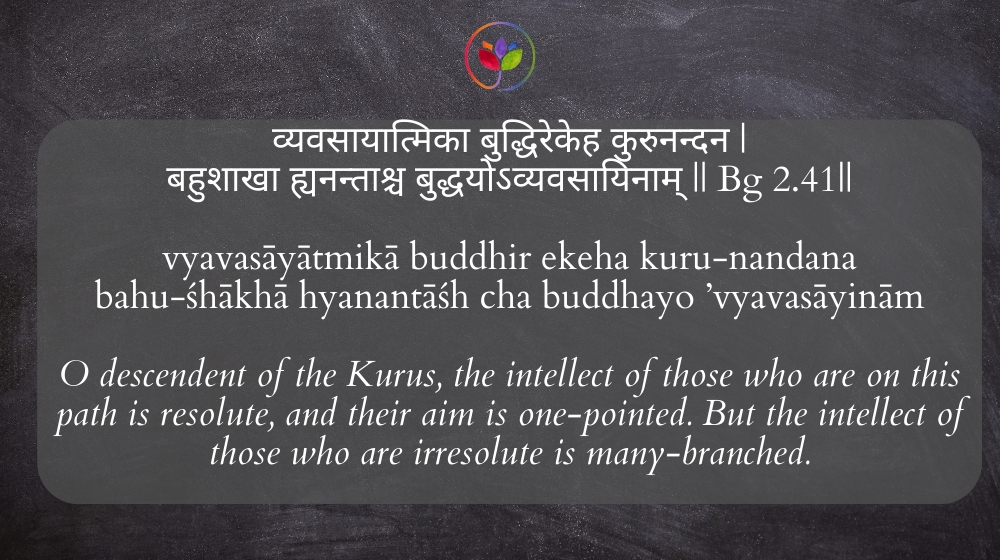
कर्मण्येवाधिकारस्ते मा फलेषु कदाचन |
मा कर्मफलहेतुर्भूर्मा ते सङ्गोऽस्त्वकर्मणि || Bg 2.47 ||
karmaṇy-evādhikāras te mā phaleṣhu kadāchana
mā karma-phala-hetur bhūr mā te saṅgo ’stvakarmaṇi
You have a right to perform your prescribed duties, but you are not entitled to the fruits of your actions. Never consider yourself to be the cause of the results of your activities, nor be attached to inaction.
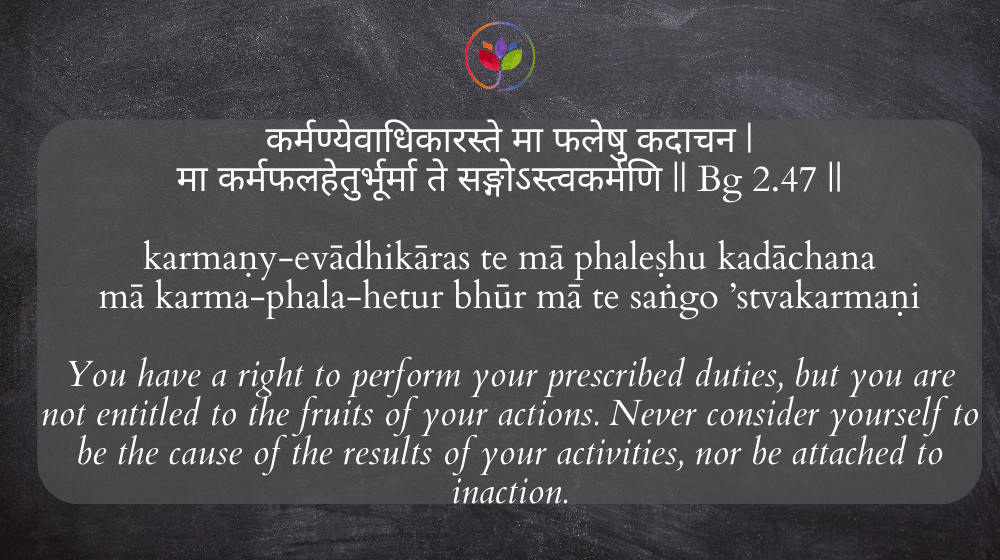
यथा दीपो निवातस्थो नेङ्गते सोपमा स्मृता |
योगिनो यतचित्तस्य युञ्जतो योगमात्मन: || Bg 6.19||
yathā dīpo nivāta-stho neṅgate sopamā smṛitā
yogino yata-chittasya yuñjato yogam ātmanaḥ
Just as a lamp in a windless place does not flicker, so the disciplined mind of a yogi remains steady in meditation on the Supreme.
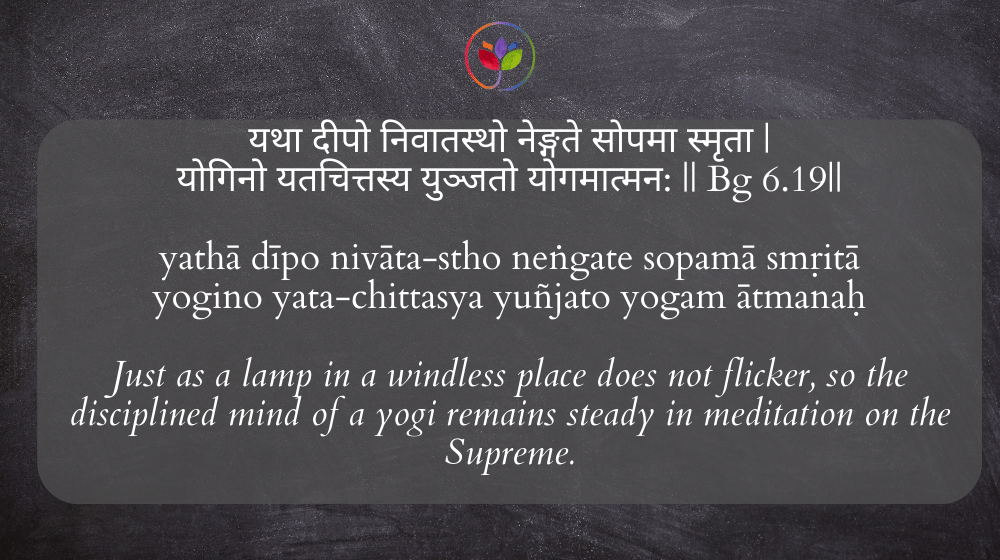
Bhagavad Gita quotes on Positive Thinking
योगयुक्तो विशुद्धात्मा विजितात्मा जितेन्द्रिय: |
सर्वभूतात्मभूतात्मा कुर्वन्नपि न लिप्यते || Bg 5.7||
yoga-yukto viśhuddhātmā vijitātmā jitendriyaḥ
sarva-bhūtātma-bhūtātmā kurvann api na lipyate
The karma yogis, who are of purified intellect, and who control the mind and senses, see the soul of all souls in every living being. Though performing all kinds of actions, they are never entangled.
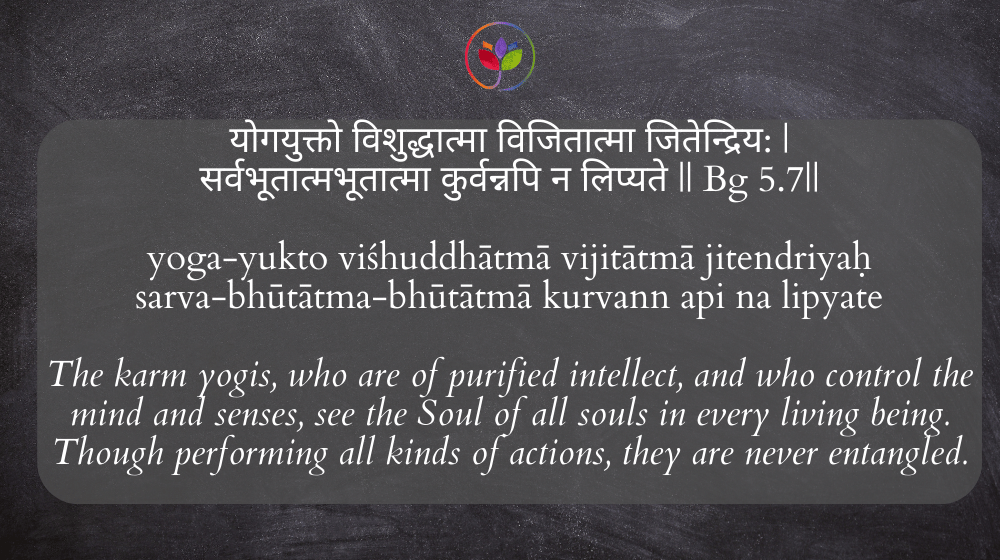
तद्बुद्धयस्तदात्मानस्तन्निष्ठास्तत्परायणा: |
गच्छन्त्यपुनरावृत्तिं ज्ञाननिर्धूतकल्मषा: || Bg 5.17||
tad-buddhayas tad-ātmānas tan-niṣhṭhās tat-parāyaṇāḥ
gachchhantyapunar-āvṛittiṁ jñāna-nirdhūta-kalmaṣhāḥ
Those whose intellect is fixed in God, who is entirely absorbed in God, with firm faith in Him as the supreme goal, such persons quickly reach the state from which there is no return, the light of knowledge has dispelled their sins.
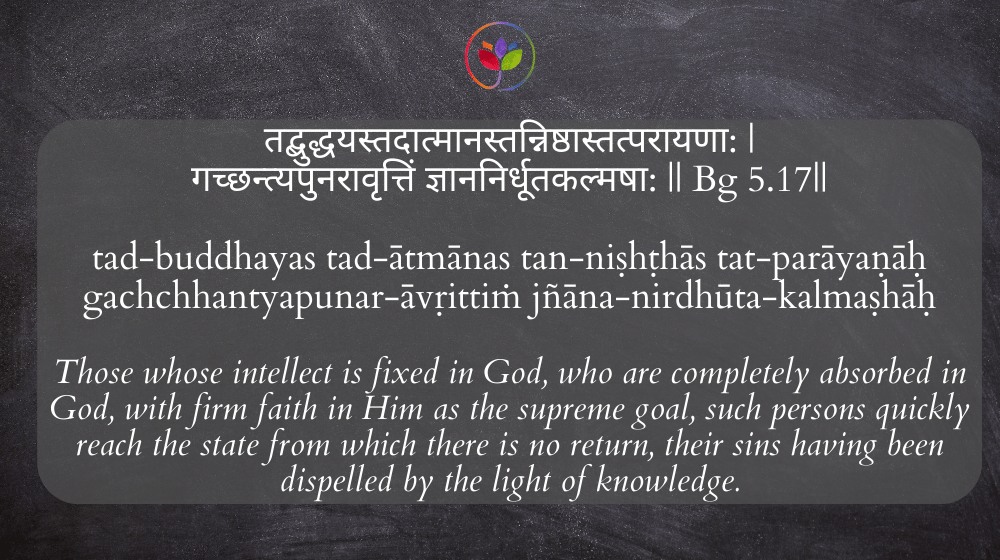
न द्वेष्ट्यकुशलं कर्म कुशले नानुषज्जते |
त्यागी सत्त्वसमाविष्टो मेधावी छिन्नसंशय: || Bg 18.10||
na dveṣhṭy akuśhalaṁ karma kuśhale nānuṣhajjate
tyāgī sattva-samāviṣhṭo medhāvī chhinna-sanśhayaḥ
Those who neither avoid disagreeable work nor seek work because it is agreeable are persons of true renunciation. They are endowed with the quality of the mode of goodness and have no doubts (about the nature of work)
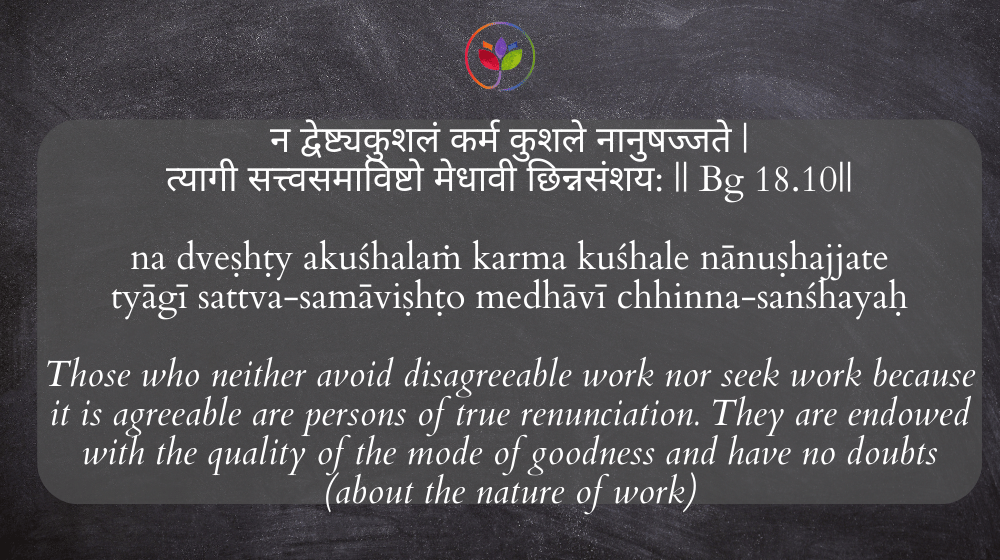
Bhagavad Gita’s most famous quotes
कर्मण्येवाधिकारस्ते मा फलेषु कदाचन |
मा कर्मफलहेतुर्भूर्मा ते सङ्गोऽस्त्वकर्मणि || BG 2.47 ||
karmaṇy-evādhikāras te mā phaleṣhu kadāchana
mā karma-phala-hetur bhūr mā te saṅgo ’stvakarmaṇi
You have a right to perform your prescribed duties, but you are not entitled to the fruits of your actions. Never consider yourself to be the cause of the results of your activities, nor be attached to inaction.
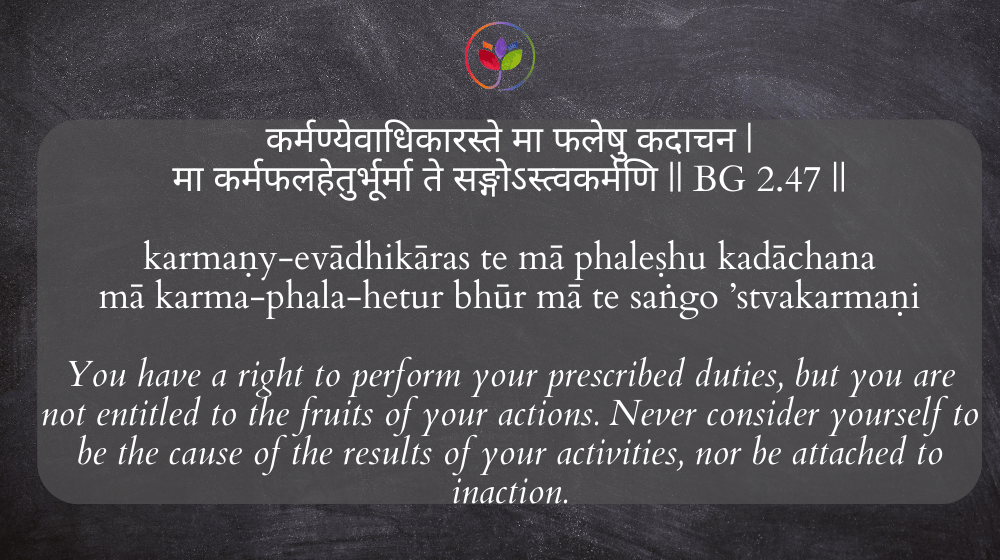
तद्विद्धि प्रणिपातेन परिप्रश्नेन सेवया |
उपदेक्ष्यन्ति ते ज्ञानं ज्ञानिनस्तत्त्वदर्शिन: || BG 4.34||
tad viddhi praṇipātena paripraśhnena sevayā
upadekṣhyanti te jñānaṁ jñāninas tattva-darśhinaḥ
Earn the truth by approaching a spiritual master. Inquire from him with reverence and render service unto him. Such an enlightened Saint can impart knowledge unto you because he has seen the truth.
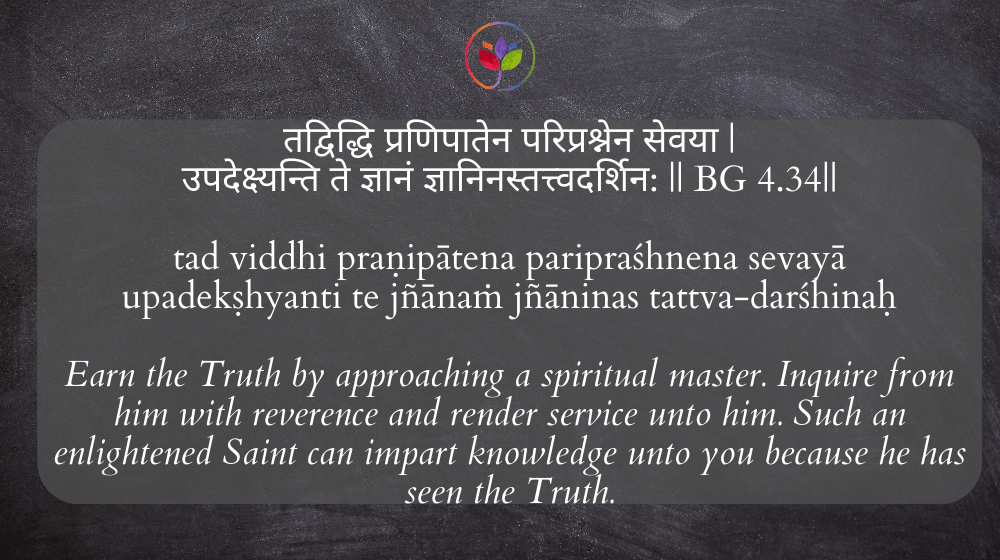
बृहत्साम तथा साम्नां गायत्री छन्दसामहम् |
मासानां मार्गशीर्षोऽहमृतूनां कुसुमाकर: || BG 10.35||
bṛihat-sāma tathā sāmnāṁ gāyatrī chhandasām aham
māsānāṁ mārga-śhīrṣho ’ham ṛitūnāṁ kusumākaraḥ
Amongst the hymns in the Samaveda, know me to be the Brihatsama; amongst poetic meters, I am the Gayatri. Of the twelve months of the Hindu calendar, I am Margsheersh, and of seasons I am spring, which brings forth flowers.
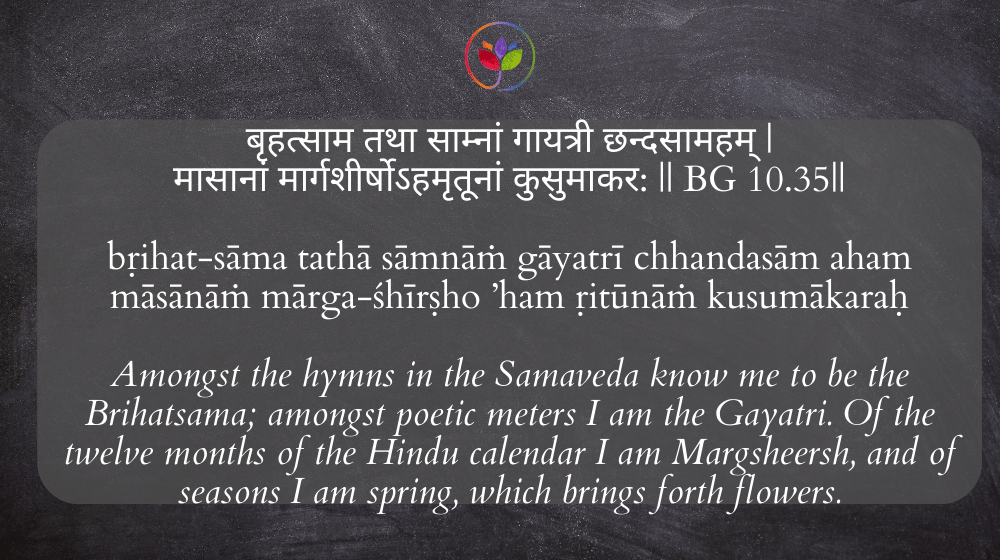
Bhagavad Gita quotes on service
Live to serve others.
अभ्यासेऽप्यसमर्थोऽसि मत्कर्मपरमो भव |
मदर्थमपि कर्माणि कुर्वन्सिद्धिमवाप्स्यसि || BG 12.10||
abhyāse ’py asamartho ’si mat-karma-paramo bhava
mad-artham api karmāṇi kurvan siddhim avāpsyasi
If you cannot practice remembering Me with devotion, try to work for Me. Thus performing devotional service to Me, you shall achieve the stage of perfection.
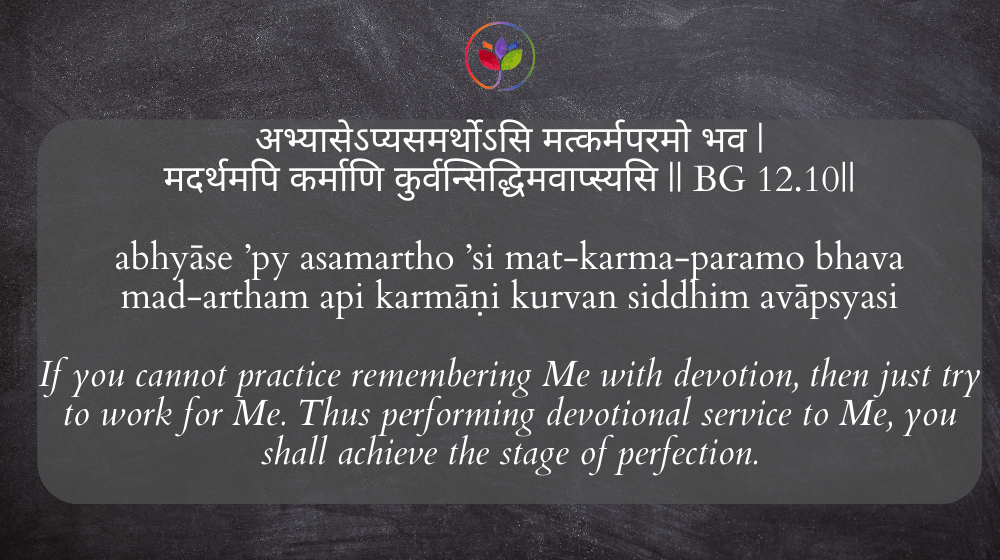
कृषिगौरक्ष्यवाणिज्यं वैश्यकर्म स्वभावजम् |
परिचर्यात्मकं कर्म शूद्रस्यापि स्वभावजम् || BG 18.44||
kṛiṣhi-gau-rakṣhya-vāṇijyaṁ vaiśhya-karma svabhāva-jam
paricharyātmakaṁ karma śhūdrasyāpi svabhāva-jam
Agriculture, dairy farming, and commerce are the natural works for those with the qualities of Vaishyas. Serving through work is the natural duty for those with the qualities of Shudras.
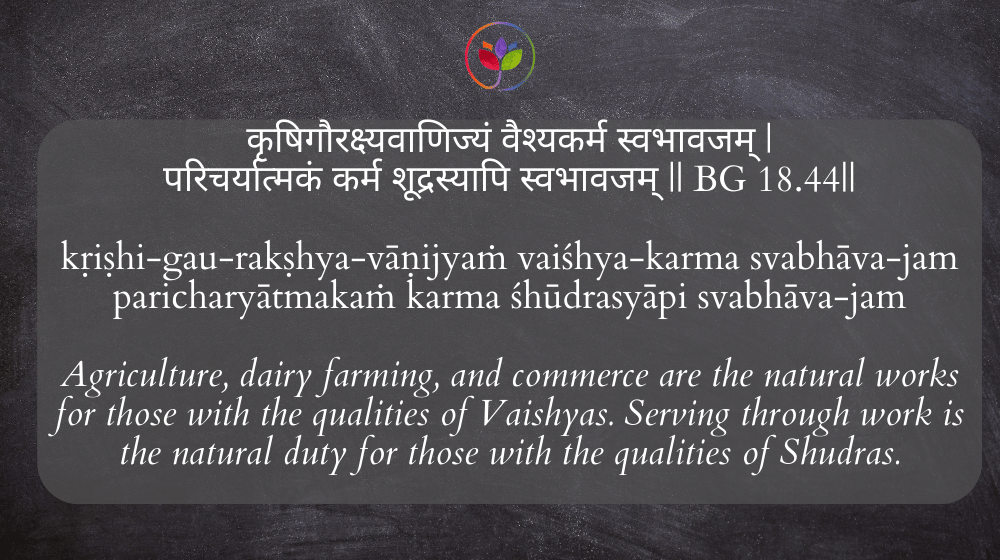
न च तस्मान्मनुष्येषु कश्चिन्मे प्रियकृत्तम: |
भविता न च मे तस्मादन्य: प्रियतरो भुवि || BG 18.69||
na cha tasmān manuṣhyeṣhu kaśhchin me priya-kṛittamaḥ
bhavitā na cha me tasmād anyaḥ priyataro bhuvi
No human being does more loving service to Me than they; nor shall there ever be anyone on this earth dearer to Me.
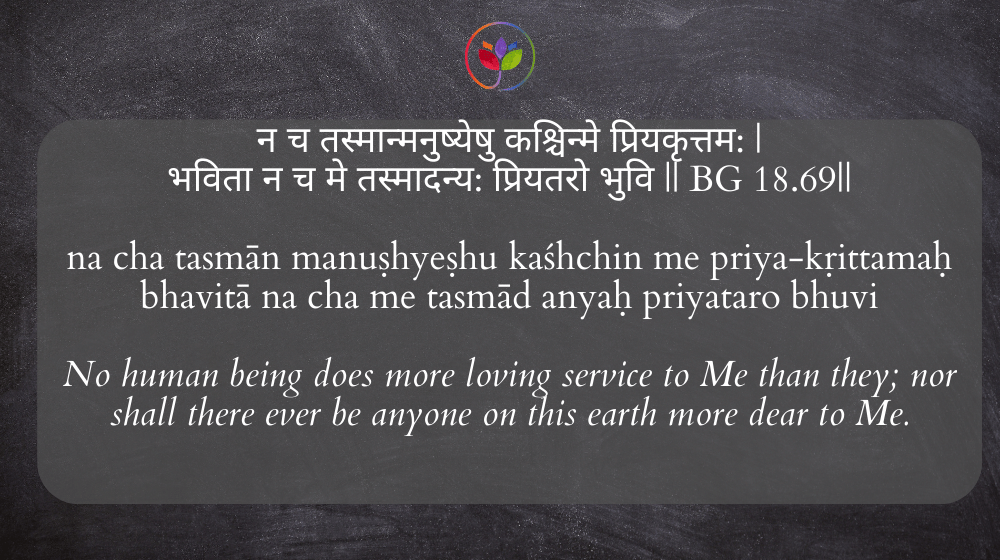
Bhagavad Gita quotes on life
न हि ज्ञानेन सदृशं पवित्रमिह विद्यते |
तत्स्वयं योगसंसिद्ध: कालेनात्मनि विन्दति || BG 4.38||
na hi jñānena sadṛiśhaṁ pavitramiha vidyate
tatsvayaṁ yogasansiddhaḥ kālenātmani vindati
In this world, there is nothing as purifying as divine knowledge. One who has attained purity of mind through the prolonged practice of Yoga receives such knowledge within the heart in due course of time.
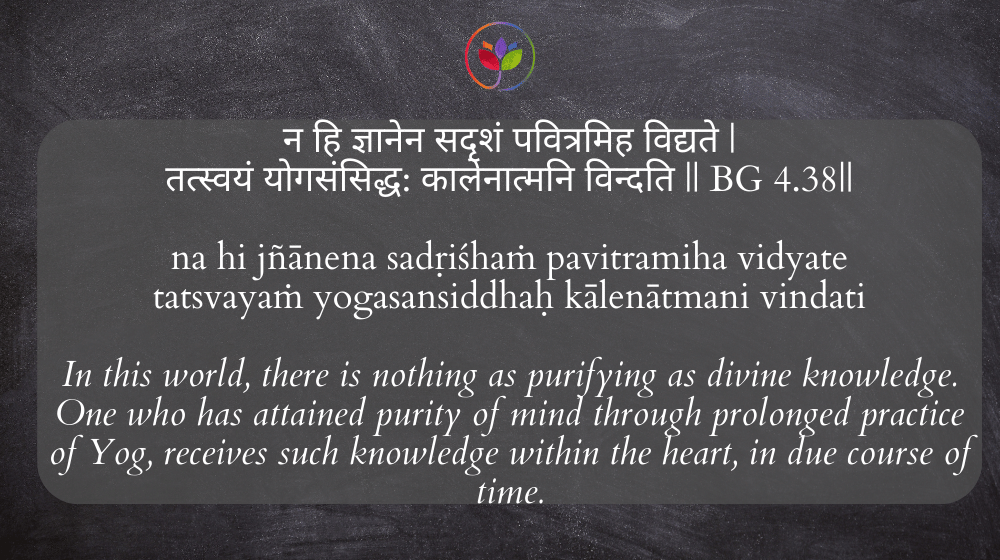
यो मां पश्यति सर्वत्र सर्वं च मयि पश्यति |
तस्याहं न प्रणश्यामि स च मे न प्रणश्यति || BG 6.30||
yo māṁ paśhyati sarvatra sarvaṁ cha mayi paśhyati
tasyāhaṁ na praṇaśhyāmi sa cha me na praṇaśhyati
For those who see Me everywhere and see all things in Me, I am never lost, nor are they ever lost to Me.
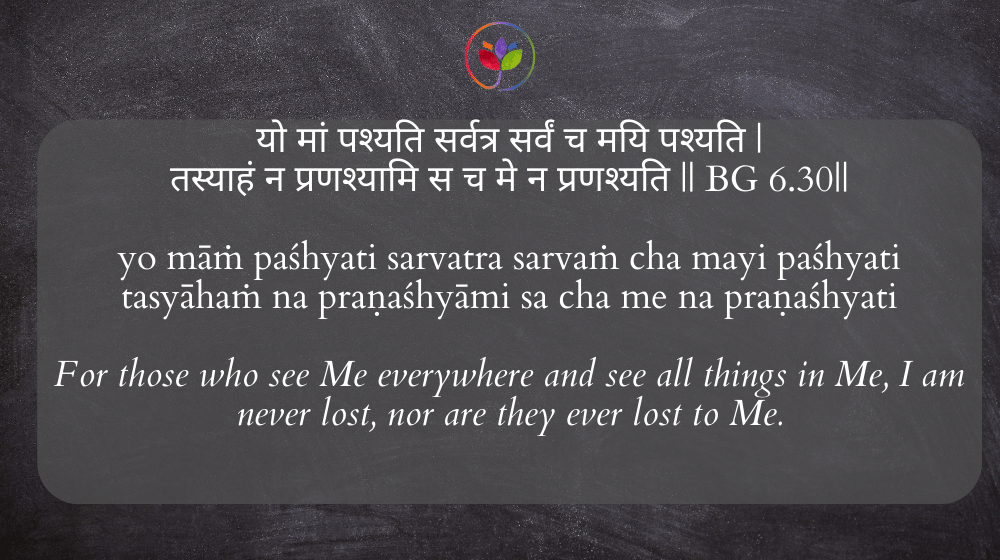
यज्ञदानतप:कर्म न त्याज्यं कार्यमेव तत् |
यज्ञो दानं तपश्चैव पावनानि मनीषिणाम् || BG 18.5||
yajña-dāna-tapaḥ-karma na tyājyaṁ kāryam eva tat
yajño dānaṁ tapaśh chaiva pāvanāni manīṣhiṇām
Actions based upon sacrifice, charity, and penance should never be abandoned; they must certainly be performed. Indeed, acts of sacrifice, charity, and penance are purifying even for wise people.
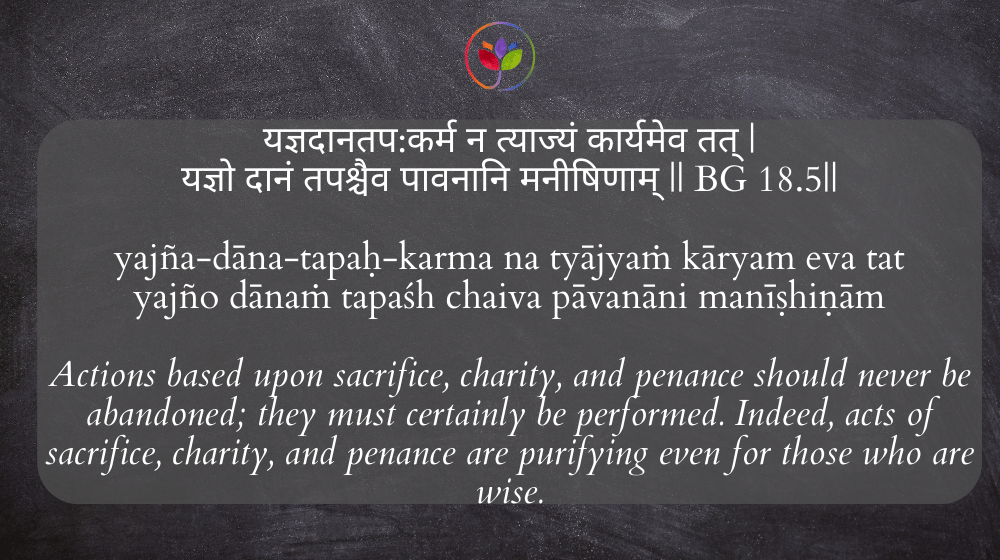
Bhagavad Gita quotes on love
उदारा: सर्व एवैते ज्ञानी त्वात्मैव मे मतम् |
आस्थित: स हि युक्तात्मा मामेवानुत्तमां गतिम् || BG 7.18||
udārāḥ sarva evaite jñānī tvātmaiva me matam
āsthitaḥ sa hi yuktātmā mām evānuttamāṁ gatim
All those who are devoted to Me are indeed noble. But those in knowledge, who are of the steadfast mind, whose intellect is merged in Me, and who have made Me alone as their supreme goal, I consider as My very self.
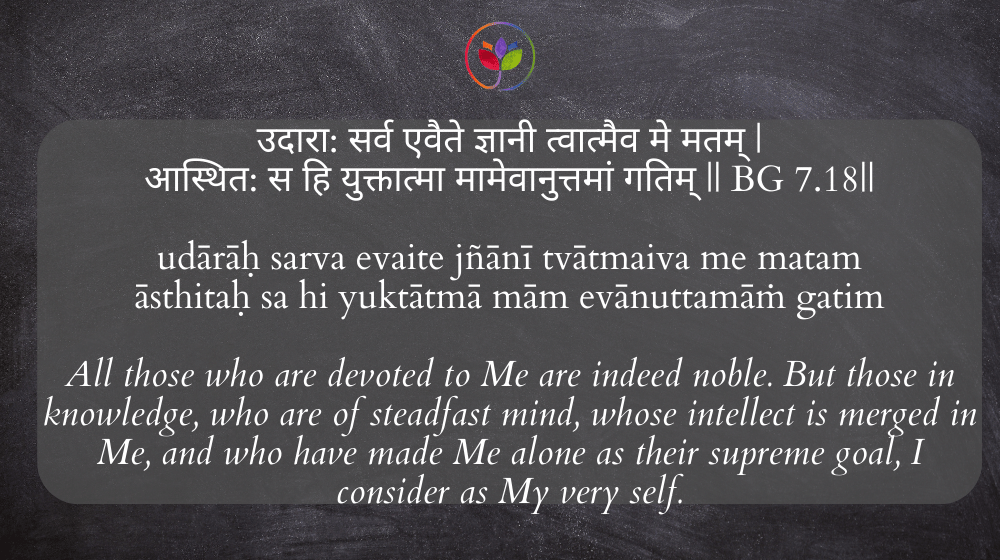
समोऽहं सर्वभूतेषु न मे द्वेष्योऽस्ति न प्रिय: |
ये भजन्ति तु मां भक्त्या मयि ते तेषु चाप्यहम् || 9.29||
samo ’haṁ sarva-bhūteṣhu na me dveṣhyo ’sti na priyaḥ
ye bhajanti tu māṁ bhaktyā mayi te teṣhu chāpyaham
I am equally disposed to all living beings; I am neither inimical nor partial to anyone. But the devotees who worship Me with love reside in Me and I reside in them.
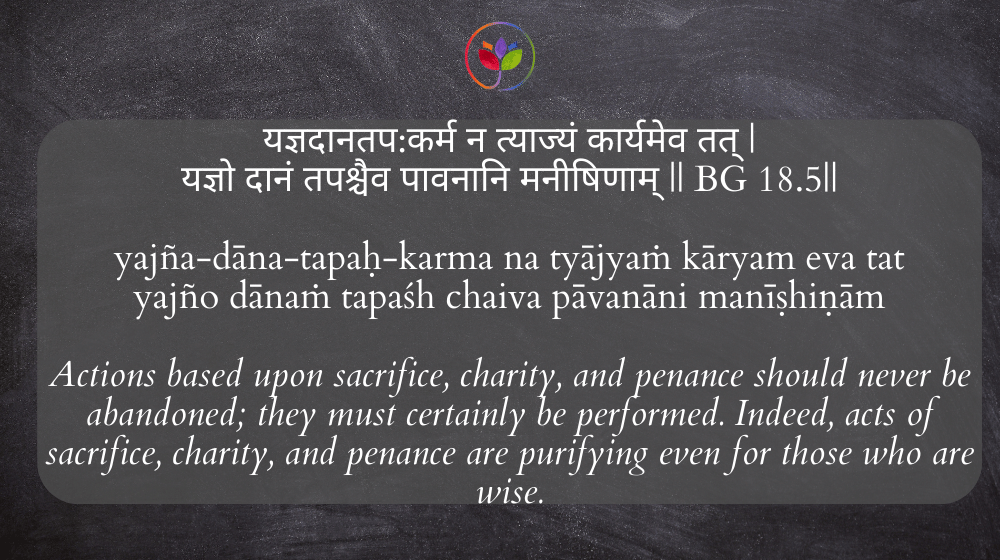
भक्त्या मामभिजानाति यावान्यश्चास्मि तत्त्वत: |
ततो मां तत्त्वतो ज्ञात्वा विशते तदनन्तरम् || BG 18.55||
bhaktyā mām abhijānāti yāvān yaśh chāsmi tattvataḥ
tato māṁ tattvato jñātvā viśhate tad-anantaram
Only by loving devotion to Me does one come to know who I am in truth. Then, having come to know Me, My devotee enters into full consciousness of Me.
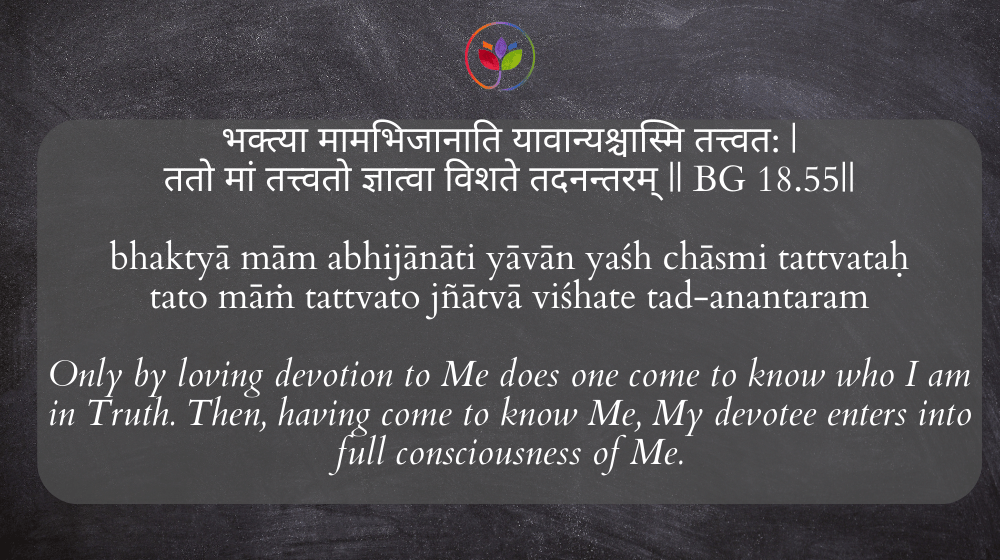
Bhagavad Gita quotes on Contentment
Stay content with the truth, whatever it may be.
यदृच्छालाभसन्तुष्टो द्वन्द्वातीतो विमत्सर: |
सम: सिद्धावसिद्धौ च कृत्वापि न निबध्यते || BG 4.22||
yadṛichchhā-lābha-santuṣhṭo dvandvātīto vimatsaraḥ
samaḥ siddhāvasiddhau cha kṛitvāpi na nibadhyate
Content with whatever gain comes of its own accord and free from envy, they are beyond the dualities of life. Being equipoised in success and failure, they are not bound by their actions, even while performing all kinds of activities.
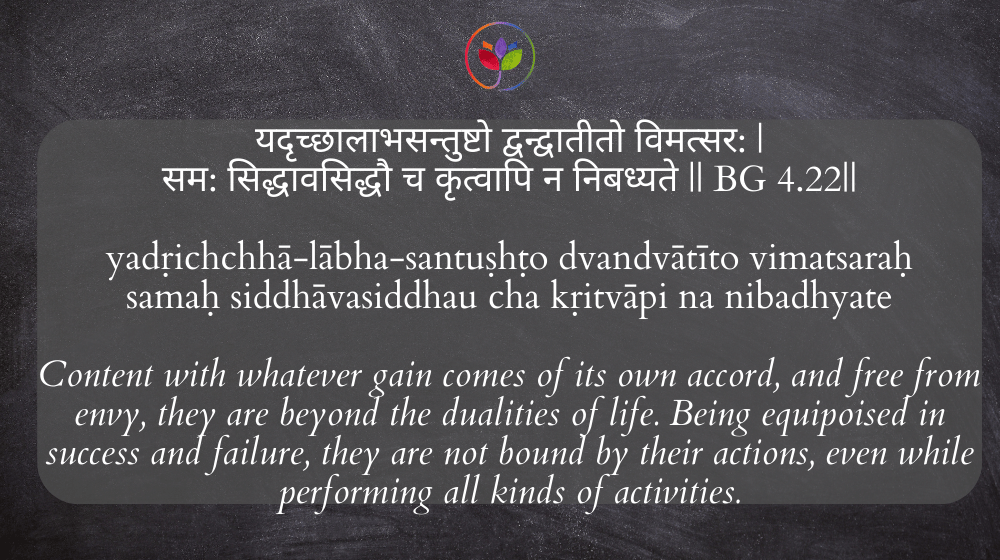
मच्चित्ता मद्गतप्राणा बोधयन्त: परस्परम् |
कथयन्तश्च मां नित्यं तुष्यन्ति च रमन्ति च || BG 10.9||
mach-chittā mad-gata-prāṇā bodhayantaḥ parasparam
kathayantaśh cha māṁ nityaṁ tuṣhyanti cha ramanti cha
With their minds fixed on Me and their lives surrendered to Me, My devotees remain content in Me. They derive great satisfaction and bliss in enlightening one another about Me and conversing about My glories.
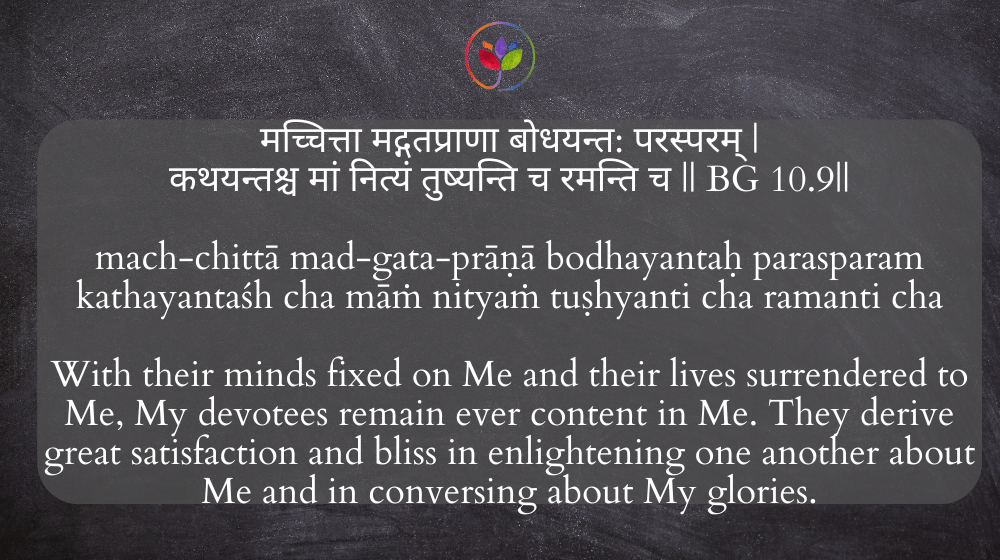
मय्येव मन आधत्स्व मयि बुद्धिं निवेशय |
निवसिष्यसि मय्येव अत ऊर्ध्वं न संशय: || BG 12.8||
mayy eva mana ādhatsva mayi buddhiṁ niveśhaya
nivasiṣhyasi mayy eva ata ūrdhvaṁ na sanśhayaḥ
Fix your mind on Me alone and surrender your intellect to Me. Thereupon, you will always live in Me. Of this, there is no doubt.
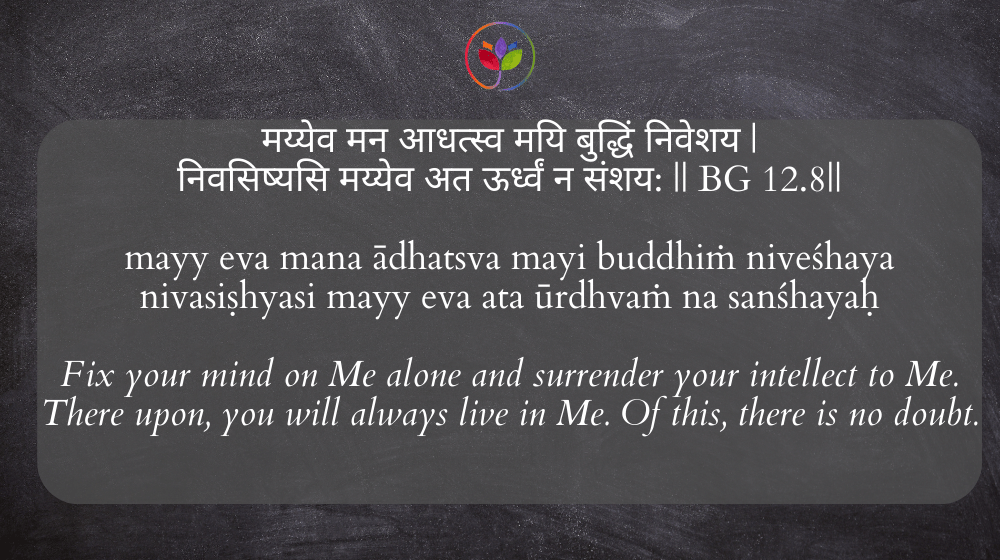




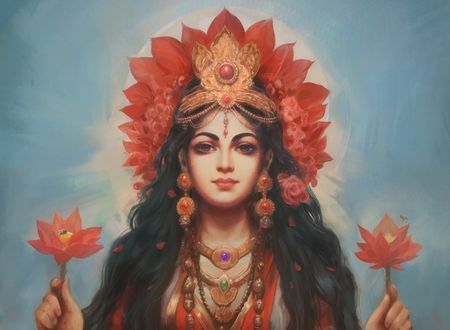

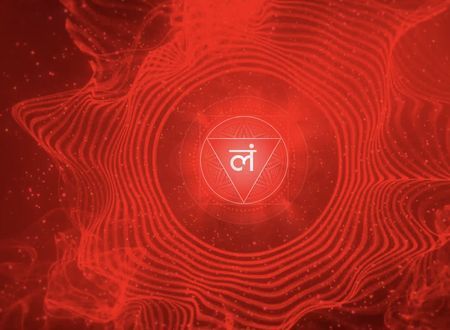



Comments & Discussion
1 COMMENTS
Please login to read members' comments and participate in the discussion.